KCUR interviewed Pritchett about his novella "Tania the Revolutionary"
Michael Pritchett’s new work of fiction is the third book for this University of Missouri-Kansas City associate professor of English. Read more from KCUR.
Jun 30, 2020
Scott Fullwiler co-writes article on fiscal deficits and central bank financing
In the June 30 issue of The Business Times, UMKC Economics Associate Professor Scott Fullwiler addresses reasons to not fear fiscal deficits and central bank financing. Read the article.
Jun 30, 2020
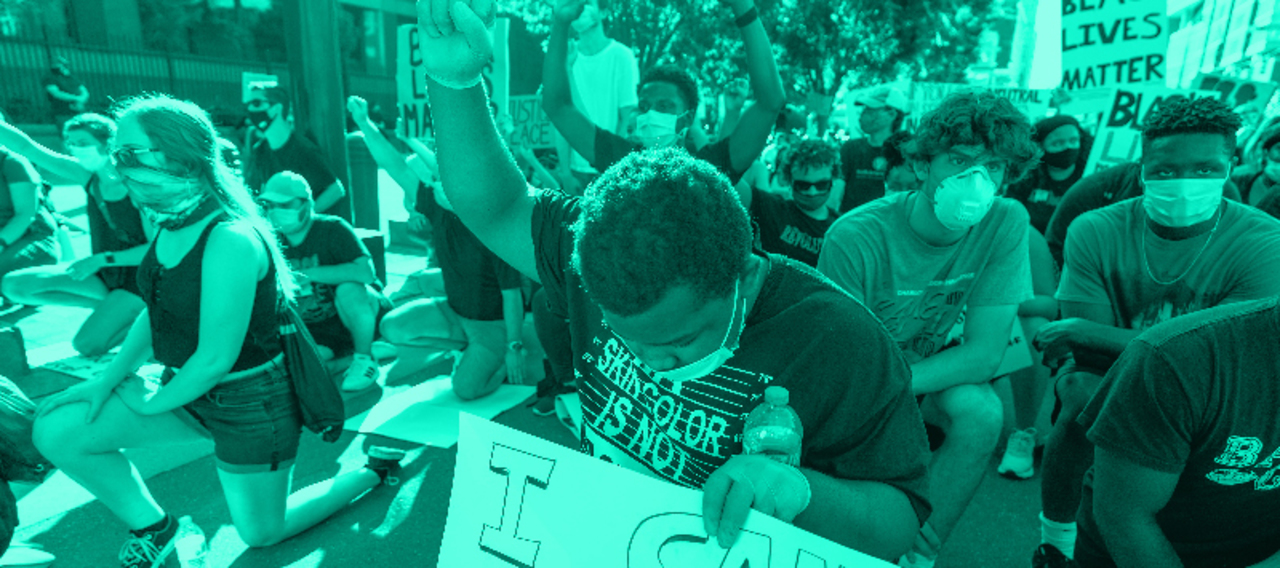
Read about the latest town hall
The University of Missouri-Kansas City Division of Diversity and Inclusion hosts a series of critical conversations addressing systemic racism in the United States.
UMKC people are taking thoughtful action on campus and in our community to ensure lasting and comprehensive reform through Roos Advocate for Community Change, a campus-wide effort announced in June following the death of George Floyd.
Critical Conversations are part of that initiative. The panel discussions are in a Zoom town hall-format and feature UMKC faculty, staff, students and volunteer leaders who represent the topic being discussed. The sessions are free and open to the community at-large, but pre-registration is required online.
The goal of each discussion is to enlighten, educate and explore the causes and potential cures for racism. Further, the university will strive to share actionable steps that can be used to improve racial interactions in the broader community. For more information, please email umkcchancellor@umkc.edu.
Critical Conversations Series
Eighth Session, April 22: Black and Brown Excellence in the Classroom: Exploring Bridges and Barriers to Success
Panelists include Brandon E. Martin, Ed.D., UMKC vice chancellor and director of athletics; Edgar J. Palacios, president and CEO of the Latinx Education Collaborative; Loyce Caruthers, Ph.D., UMKC professor of educational leadership, policy and foundations; Lauren Sanchez, program director at Kauffman Scholars; Gary O'Bannon (moderator), executive-in-residence, UMKC Henry W. Bloch School of Management; Adriana Suarez (co-moderator), UMKC student.
Seventh session, Feb. 18: Politics and the State of Black and Brown America
Panelists included: Tom Carignan, Overland Park City Council member; Irene Caudillo, president and CEO of El Centro; Kelvin Simmons, co-founder of the Nexus Group, a full-service government affairs firm; Beth Vonnahme, associate professor of political science and associate dean of the College of Arts and Sciences at UMKC; Gary O'Bannon (moderator), executive-in-residence, Henry W. Bloch School of Management; Charisma Sewell (co-moderator), UMKC political science major.
Sixth session, Oct. 7: A Dialogue Among Women of Color and White Women in Higher Education
Panelists included: Karen Lee Ashcraft, professor, College of Media, Communication, and Information at University of Colorado Boulder; Karen L. Dace, vice chancellor, Diversity, Equity and Inclusion at Indiana University-Purdue University Indianapolis; Lona Davenport (co-moderator), senior diversity program coordinator, UMKC Division of Diversity and Inclusion; Christine Grant, professor of chemical and biomolecular engineering, former associate dean of faculty advancement, North Carolina State University; Jennifer Laflam, professor and director of Center for Teaching and Learning at American River College; Tamica Lige (co-moderator), program coordinator, Students Training in Academia, Health, and Research (STAHR); Shani Barrax Moore, director of diversity and inclusion, University of North Texas; Julia Vargas, director, Center for Service Learning, Rockhurst University.
Fifth session, Oct. 5: The Future of Policing in Kansas City, A Conversation with Mayor Quinton Lucas
Panelists included: Mayor Quinton Lucas; Brandon Henderson, president of the UMKC Student Government Assocation; Ken Novak, professor in the UMKC Department of Criminal Justice and Criminology; Gary O'Bannon (moderator), executive-in-residence, Henry W. Bloch School of Management. Hosted by the UMKC Student Government Association.
Fourth session, Sept. 17: The Color of Money, Racism in Finance
Panelists included: Ruben Alonso, president, AltCap; Victor Hammonds, director of small business banking, 1st National Bank of Omaha; Nathan Mauck, associate professor of finanace, Henry W. Bloch School of Management; Gary O'Bannon (co-moderator), executive-in-residence, Henry W. Bloch School of Management; Nick Richmond, president and CEO, Kansas City Credit Union; Lisa Uhrmacher (co-moderator), IoT and analytics practice lead, Atos.
Third session, Aug. 27: The Future of Policing, Part 2
Panelists included: Gwendolyn Grant, president and CEO of the Urban League of Greater Kansas City; Ronald Lindsay, pastor of the Concord Fortress of Hope Church; Ken Novak, professor in the UMKC Department of Criminal Justice and Criminology; Deputy Chief Karl Oakman, Kansas City, Missouri Police; Gary O'Bannon (co-moderator), executive-in-residence, Henry W. Bloch School of Management; Cynthia L. Short, trial lawyer, mitigation specialist and sentencing advocate; Jasmine Ward (co-moderator) third-year student at the UMKC School of Law.
Second session, July 30: The Future of Policing, Part 1
Panelists included: Jean Peters Baker, Jackson County prosecutor; Emanuel Cleaver III, senior pastor of St. James United Methodist Church; Damon Daniel, president of the AdHoc Group Against Crime; Toya Like, associate professor, UMKC Department of Criminal Justice and Criminology; Gary O'Bannon (co-moderator),executive-in-residence, Henry W. Bloch School of Management and former Director of Human Resources, City of Kansas City, Mo.; Jasmine Ward (co-moderator), third-year student at the UMKC School of Law.
First session, July 8: Systemic Racism in the Workforce
Panelists included: Clyde McQueen, President and Chief Executive Officer, Full Employment Council; Uzo Nwonwu, Corporate Legal Counsel, UMB Bank; Jeffrey J. Simon, Office Managing Partner, Husch Blackwell LLP; A'yanna Tomlin, UMKC student, studying Business Administration; Gary O'Bannon (moderator), executive-in-residence, Henry W. Bloch School of Management and former Director of Human Resources, City of Kansas City, Mo.
Jun 29, 2020
Max Skidmore was again tapped for commentary
The Portland Press Herald recently reprinted a Washington Post article quoting UMKC Professor Emeritus Max Skidmore. Skidmore is the author of a book on presidential leadership during health crises.
Jun 27, 2020
Local, national media outlets share details about the new scholarship
The scholarship, announced on June 24, provides first-semester grad school tuition for adults hit by the COVID-19 recession. This story was picked up by more than 65 sources, including Business Insider, Yahoo Finance and The Kansas City Business Journal.
Jun 26, 2020
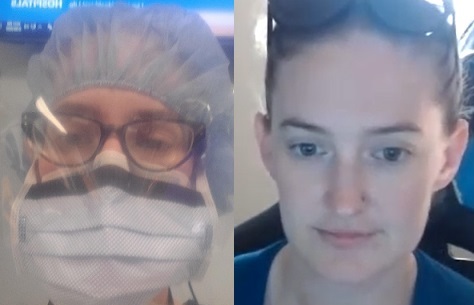
Desire to help other nurses led her to the epicenter of COVID-19 cases
What could cause a nurse to leave family and safety behind to work at a New York City hospital filled with COVID-19 patients, many of them destined to die on her watch?
“I really wanted to help my fellow nurses,” said Hanna Bates-Crosby, RN, who works at the UMKC School of Dentistry and is trained as an emergency room nurse. “I went with my sister, who’s also a nurse, because we knew the nurses and doctors in New York were struggling, drowning in patients. I didn’t know how I could ethically not go and use my skills to help them.”
Bates-Crosby and her sister, who is trained in intensive care, were among the first of thousands of nurses from across the country who went to New York to help. They arrived March 26, just after a week in which the number of COVID-19 patients in New York City had increased tenfold.
“It truly was a war zone,” said Bates-Crosby, who worked the 7 p.m. to 7 a.m. shift for seven straight days at one of the hardest-hit hospitals in Queens. “A trauma bay designed for four patients would have eight or 10 patients in it, and one nurse, because that was all we had. Another room meant for a few heart attack patients would have a dozen COVID patients and two nurses.”
On one of her shifts, 30 people died. “Those people who don’t believe they were loading bodies into semi-trailers need to believe it,” she said. “It happened.”
Away from the emergency room, on the regular hospital floors, “it was still practically all COVID patients, and if someone came in with something else, within a couple of days they could have COVID. There was no way to separate and protect the non-COVID patients,” she said.
“But we went in knowing it wasn’t going to be normal nursing. We were going to see a lot of death, and not be able to do much for many of the patients. It was hard, being there for a patient and sedating them and putting them on a ventilator, knowing the odds of them coming off were not good.”
She remembered one patient in particular. Making a rectangle around her eyes with her hands, to represent her hospital mask and other protective gear, Bates-Crosby said, “Knowing my face, this much of my face, was probably going to be the last face he saw — that was hard.”
“It was hard, being there for a patient and sedating them and putting them on a ventilator, knowing the odds of them coming off were not good.” Hanna Bates-Crosby
But the difficult experiences were worth it, she said, to do what she could to support her colleagues. “One doctor asked me where I was from, because I sounded different,” she said. “She couldn’t believe I had come all the way from Kansas City to help them.”
Since returning, she said, “I have dreams sometimes where I’m in that emergency room. And I’m a very auditory person, so for a while I would wake up and hear ventilator alarms going off. But I was only there a week, so I’m doing all right. I worry about the nurses who are still there, getting COVID or just being exhausted.”
When she and her sister returned to Kansas City, they still had to quarantine in a motel for two weeks. “That was hard, too. My husband was really good about it, bringing food and clothes, but he said, ‘It’s like you’re back, but you’re not really back.’ ”
When quarantine was over, she finished coursework that added a bachelor’s in nursing degree to her RN, and in August she will start classes toward becoming a nurse practitioner. Bates-Crosby also picks up shifts administering infusion therapy in people’s homes. But she’s most looking forward to working again at the School of Dentistry as its clinics reopen, she hopes in July.
“I really miss the students,” Bates-Crosby said. “It will be good to be back.”
Jun 25, 2020
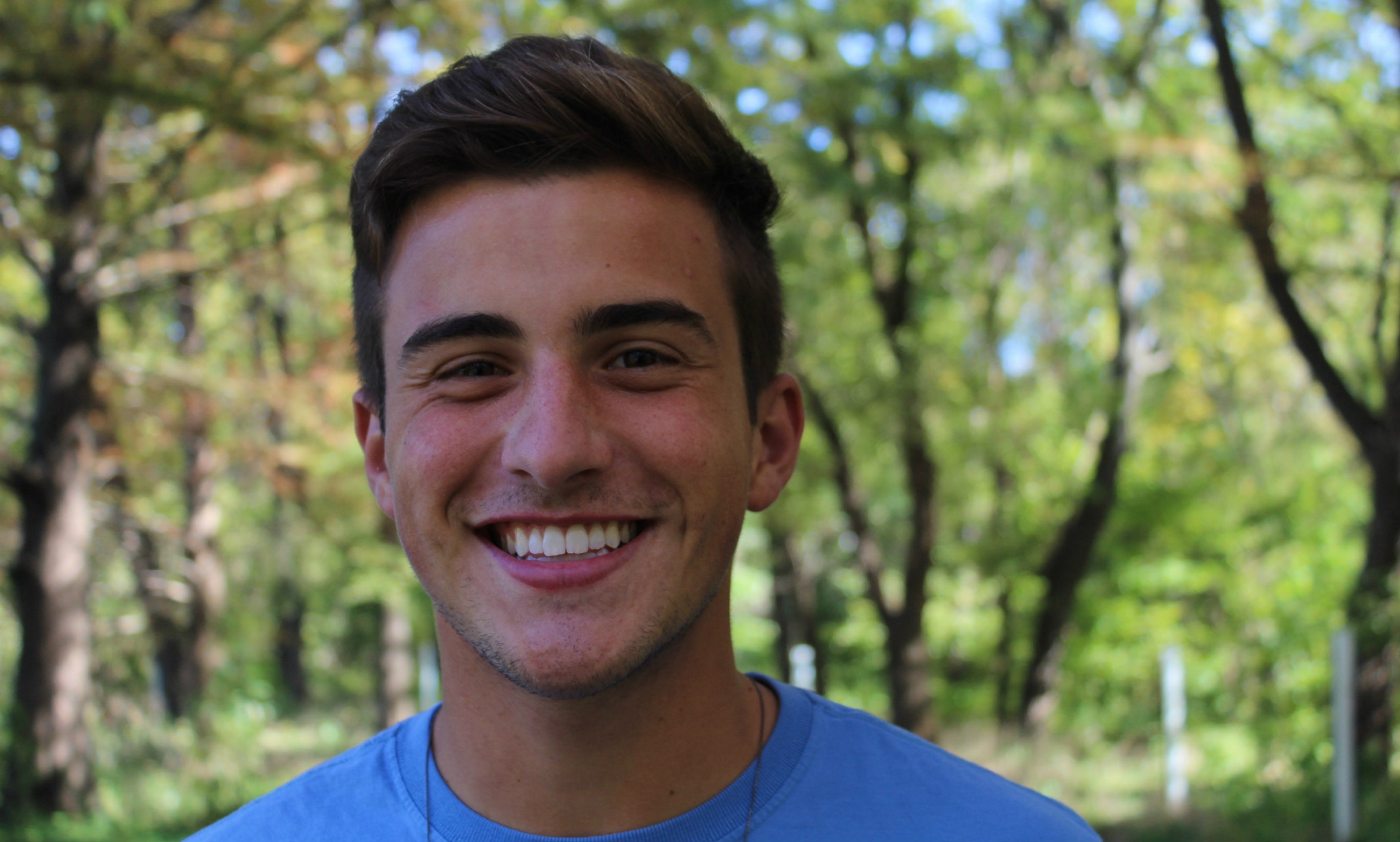
New York investment firm adds UMKC student to its Ivy League lineup
Eduardo Avendano, a rising senior in the Henry W. Bloch School of Management, is chasing a dream.
“I want to achieve big things,” Avendano says.
He is off to a good start. Avendano, who is majoring in business administration in finance, is a native of Brazil. Attending UMKC was the first step on the path toward a long-term goal.
“I decided to come to the U.S. for college so I could chase my goal of building my career closer to the biggest players in the financial market.”
Last fall, he interviewed with more than 30 companies in the United States for a summer internship. Avendano knew that the large New York-based firms usually hire interns from Ivy League colleges.
He was undaunted.
“I want to achieve big things.” — Eduardo Avendano
“I understood that the easiest way for the firms to sort so many people applying for the same position was to separate people by school,” he says. “I had so many automated emails saying I did not get the job.”
To change the outcome, he decided to change his approach.
“Not only was I applying through the websites, I started cold calling, adding connections through LinkedIn and sending emails.”
Using this method, he applied for 30 jobs and secured one interview at Ares Management Corporation.
“Out of more than 3,000 applicants, 100 people were selected for a phone interview. I told my story and clinched the in-person interview in New York two weeks later.”
Besides Avendano, four other candidates received an invitation to interview in person.
“You can probably guess their backgrounds. Two were from Wharton [School of the University of Pennsylvania], one was from Brown University, one from Cornell University. And then there was me.”
Avendano was not intimidated.
“Even though there were more than 3,000 candidates, the moment I had the phone interview I knew would get the job.”
He was able to visit the company before the escalation of the COVID-19 outbreak. The energy of New York City did not disappoint.
“I stayed in a hotel overlooking Central Park. I love the energy of the city. When I looked down from the 42nd floor, I knew I was making the right decision."
While the outbreak of COVID-19 has upset some of his plans, Avendano has remained positive even as he has been working at home in Kansas City.
“It’s still very exciting,” he says. “We are supposed be in the office in the next few weeks.”
"Even though there were more than 3,000 candidates, the moment I had the phone interview, I knew I would get the job." — Eduardo Avendano
Avendano would encourage anyone with a similar dream to be as tenacious as he was.
“I wanted to be where the best players in the market are. I knew some of the other candidates had more choices, but I knew I had the qualities to be as successful as they could.”
He recommends being tenacious in the search, even if something seems like a long-shot.
“It’s not an easy thing, but anyone can do it,” he says. “Just because you keep hearing ‘no’ doesn’t mean you’re not capable. You just better be prepared for the next ‘yes.’”
Jun 25, 2020
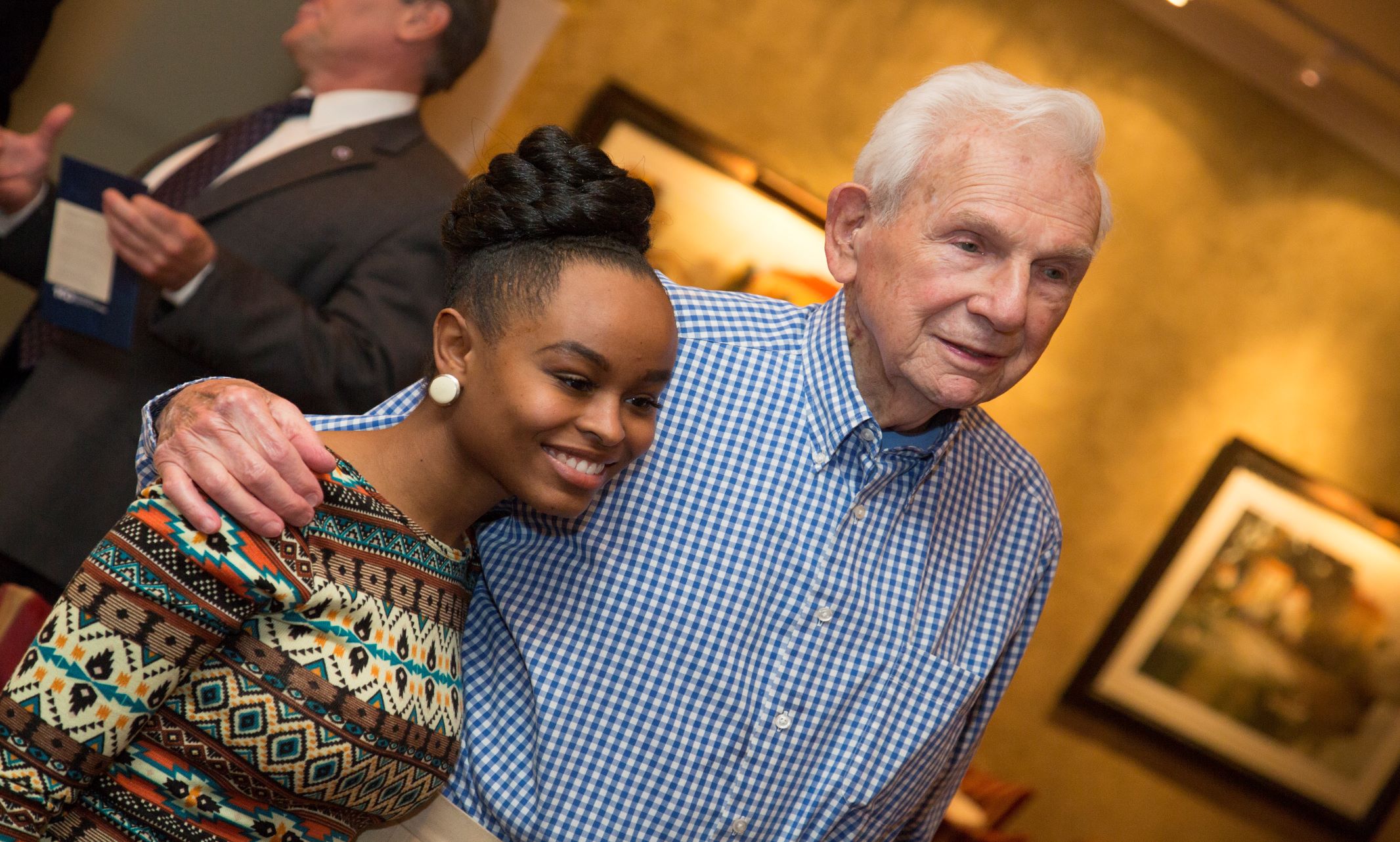
New scholarship provides first-semester grad school tuition for adults hit by COVID-19 recession
Kansas City working professionals facing career setbacks due to the COVID-19-related recession can get a helping hand toward a fresh start, in the generous tradition of the late Henry W. Bloch: free fall tuition for the first semester for graduate school programs at his namesake school of management at UMKC.
Henry Bloch never wavered in his support for Kansas City, or in championing the people of his hometown. Following his example, the UMKC Bloch School of Management and the Marion and Henry Bloch Family Foundation are helping Kansas Citians affected by COVID-19 begin the next step in their careers and lives.
One of the first scholarship programs in the nation aimed specifically at working professionals suffering financial hardship due to the coronavirus recession, the Bloch Helping Hand Scholarship provides awardees free tuition for their first semester in a Bloch graduate program and immediate access to the Bloch School’s career and entrepreneurship resources.
“We know what Dad would do in this difficult time; he would seek out unique ways to help those most in need.” said his son, Tom Bloch, chairman of the Bloch Family Foundation. “With this program, the school that bears his name is honoring his generous spirit to help those who have suffered unprecedented hardship and uncertainty by providing a pathway forward and upward through education.”
Helping Hand Scholarships are available to people living in the greater Kansas City designated market area who have suffered job loss, furloughs, or other financial hardships as a result of the pandemic. Applications are available at this link and must be submitted by August 1.
“Support for working professionals who have experienced job loss or other financial hardships due to the coronavirus recession is a critical unmet need,” said Brian Klaas, dean of the Bloch School. “Providing scholarship support during these challenging times is a fitting legacy of Henry Bloch’s lifetime of leadership and service, and we are grateful to the Bloch Family Foundation for working to address an important need within this community.”
The Bloch Helping Hand Scholarship is funded by grant from the Marion and Henry Bloch Family Foundation and is designed to help approximately 100 students restart their careers.
The Henry W. Bloch School of Management, “Kansas City’s Business School,” emphasizes programs that link Bloch students and faculty with business partners throughout greater Kansas City. For students, these strong connections offer opportunities to learn from leaders in many of Kansas City’s most successful organizations. The Bloch School full menu of resources includes career coaches, entrepreneurship mentors, social media skills builders and deep connections to Kansas City’s business community, providing opportunities for internships, full-time jobs, mentoring and project-based learning.
Apply for the scholarship
Jun 24, 2020
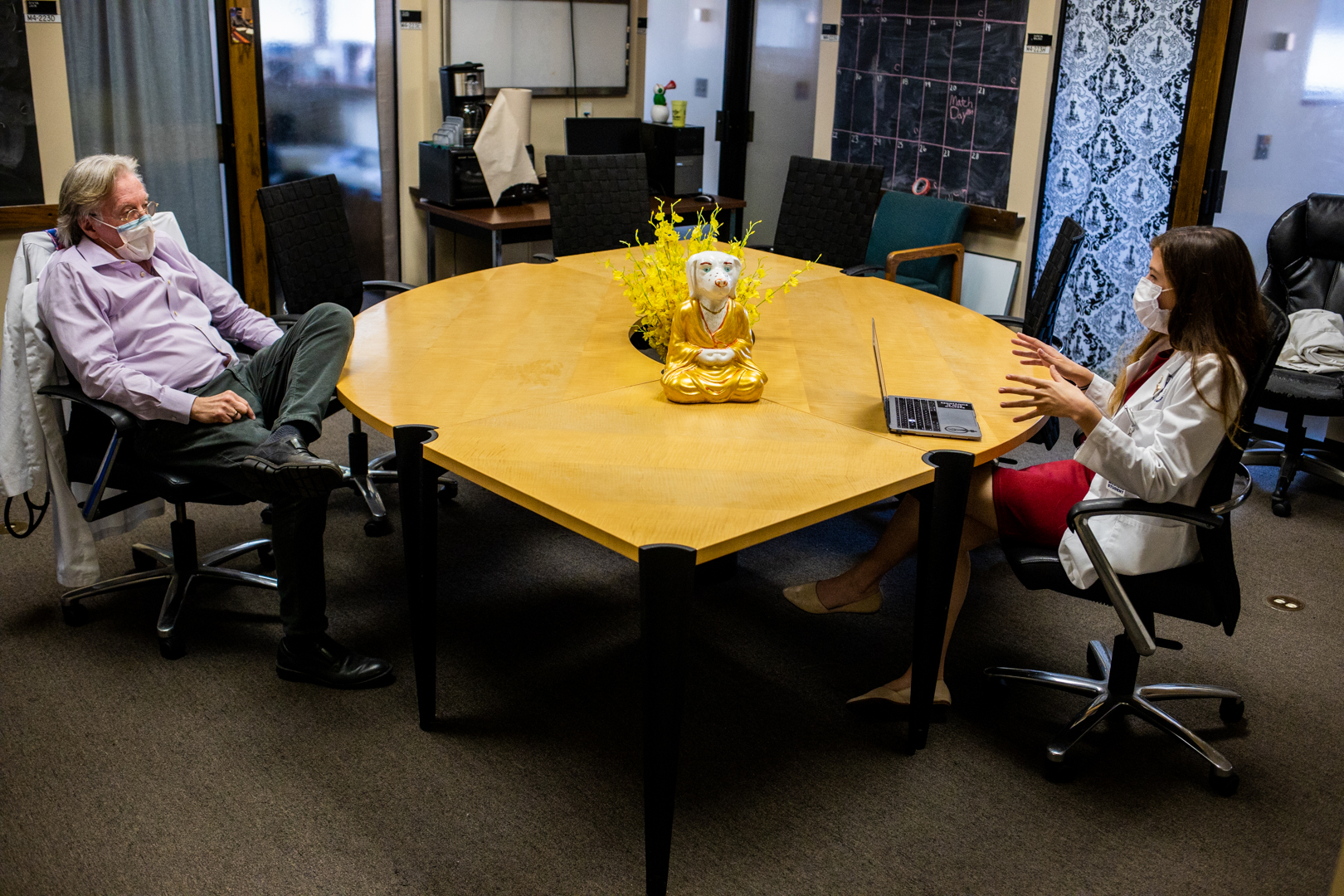
Physician mentor David John helps med student Faith Mueller toward her goal
The heart of UMKC is our campus community. With lots of opportunities, it’s easy to develop mentorship teams. And these rich relationships — our Dynamic Duos — are some of our best success stories.
Faith Mueller wants to become an obstetrician/gynecologist and change the world. David John, M.D., believes she will and is mentoring her on that path. When each talks about the other, it’s clear that their inspiration is mutual.
“Early on, I became enveloped in the world of women’s liberation,” said Mueller, who is entering her last year of the UMKC School of Medicine’s six-year B.A./M.D. program. “I started reading stories of female genital mutilation, of sexual violence, of the pregnancy circumstances in areas of instability. These were stories that I could not shake, and I knew I had found my vocation.”
Faith Mueller
When she graduates, Mueller plans to find a role in women’s global health after serving her OB/GYN residency.
John, a member of the six-year program’s original graduating class in 1977, had a long career in rheumatology in Hawaii and returned to UMKC three years ago to teach and mentor students as a docent, the teaching physician for a small “docent unit” of medical students. He and Mueller met when she joined his docent unit.
“Our students are all bright and uniquely talented,” John said, “but it is rare to have a student like Faith Mueller. In addition to exceptional capabilities, Faith has the drive and the initiative, the passion, to do great things in her career. I hope to live long enough to see her early accomplishments to improve the health of women at a global level.”
“Dr. John … approaches medicine with an empathy that is sustainable and rooted in ideas of equality. He stands for a world that is better for the people he serves.” — Faith Mueller
Her drive to get started in medicine as soon as possible led Mueller to UMKC, where she could get her M.D. two years sooner than at other universities. But in John, who as a young man envisioned being a professor of English literature, she found a mentor who also emphasized the humanities and appreciated her desire to help others.
“Dr. John is unwaveringly kind and takes the effort to see the humanity in everyone, no matter how they come to him,” Mueller said. “He approaches medicine with an empathy that is sustainable and rooted in ideas of equality. He stands for a world that is better for the people he serves.”
David John
Her mentor’s personality and commitment also make learning medicine less daunting. “I know I can always ask questions, whether about patient care, navigating the medical field, or life in general,” Mueller said.
In turn, John said, Mueller and his other students have inspired and renewed him.
“I had become intellectually complacent, emotionally placid, professionally successful but somehow not complete,” John said. “When I was a medical student here in the 1970s, certain docents showed me what it really means to wear the mantle of the physician within society. I viewed it as a great gift. This knowledge kept me true to the profession; it kept me grateful that my purpose was to help people suffer less and live healthier. When I decided it was my turn to give back, life got exciting again.
“Faith has the drive and the initiative, the passion, to do great things in her career. I hope to live long enough to see her early accomplishments to improve the health of women at a global level.” — David John
“As Faith’s mentor, I feel my major purpose is to be a sounding board and a cheerleader. Her accomplishments are her own; she created her own goals. Mueller said she appreciates his support: “Dr. John inspires me to live boldly. I feel like I can ‘go for the gold’ knowing that I have someone within the faculty who will have my back and advocate for my success.”
The med school’s docent system gave Mueller her opportunity to find a mentor, but she encourages other students to actively seek out mentors if a mentor relationship doesn’t develop naturally. “Keep your mind open for who would be a good mentor,” she said. “They don’t have to be in your field or occupation. Find someone that helps you grow as a person. Look for someone who inspires you.”
Jun 24, 2020
Scott Helm explains the impacts of JC Nichols’ policies and practices
KSHB interviewed a number of local experts for their recent story about the renaming of the JC Nichols Fountain. Scott Helm, professor at the UMKC Bloch School of Management, was one of the individuals interviewed. Read more and watch the news clip.
Jun 24, 2020
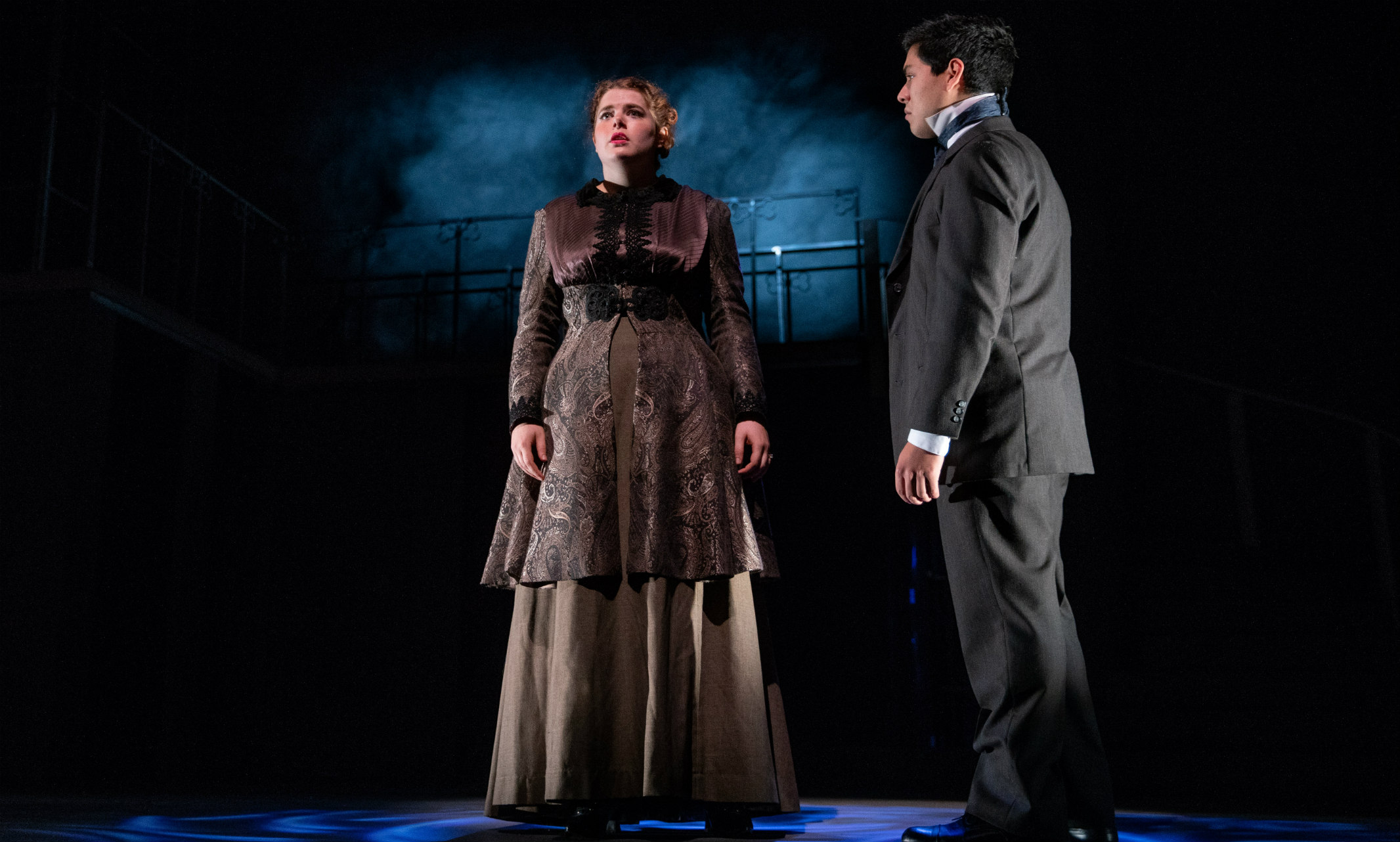
Master of Fine Arts program consistently recognized as one of the best performing arts schools
The Hollywood Reporter’s recent rankings have the University of Missouri-Kansas City Theatre graduate program at No. 24 out of 25 for the world’s top dramatic and performing arts schools, making this the second year in a row in the Top 25.
According to the Hollywood Reporter, the publication consulted with academics, influencers and alums to rank the top 25 Master of Fine Arts acting programs. In the article, the Hollywood Reporter highlighted UMKC for bringing theater, music and dance departments under one roof: the UMKC Conservatory. UMKC Theatre was also ranked in the Top 25 by the Hollywood Reporter last year at No 20.
For the third year in a row, Hollywood Reporter has also included UMKC Theatre in its national list of Top 10 Costume Design schools. UMKC Theatre offers a single comprehensive M.F.A. degree in costume design and technology, which has been key to its success. Students learn many skills including drawing, painting, sketching and learning how to construct a garment with techniques in fabric manipulation, millinery, tailoring and pattern drafting.
“The history of UMKC Theatre has been one of excellence,” said Ken Martin, Patricia McIlrath Endowed professor of Theatre and chair of UMKC Theatre. “A high quality, forward thinking faculty, coupled with a regional professional theatre on campus, results in a world class training. We are proud to be mentioned alongside these other programs, and look forward to building on the traditions and quality already established.”
As well as merging with the UMKC Conservatory in 2019, Martin was named chair of the UMKC Theatre Department. The merger was a natural alignment: the two programs share a long history of collaboration, a physical space, a conservatory model of teaching where students receive intensive hands-on training while gaining analytical skills taught by professional performing artists, a professional-school focus, a strong national reputation, a spirit of civic engagement and a supportive philanthropic audience.
UMKC Theatre continues to make the entire city an artistic campus. In addition to its on-campus partnership with Kansas City Repertory Theatre, this year the program continues to partner with Unicorn Theatre, Coterie Theatre and Kansas City Actors Theatre, featuring MFA and Bachelor of Arts acting students in major professional roles.
Alumni include Nick Gehlfuss of “Chicago Med,” Patrick DuLaney of “Harry Potter and the Cursed Child on Broadway” and Toccara Cash of Broadway’s “The Play That Goes Wrong” and “Half Me, Half You” at London’s West End.
Jun 23, 2020
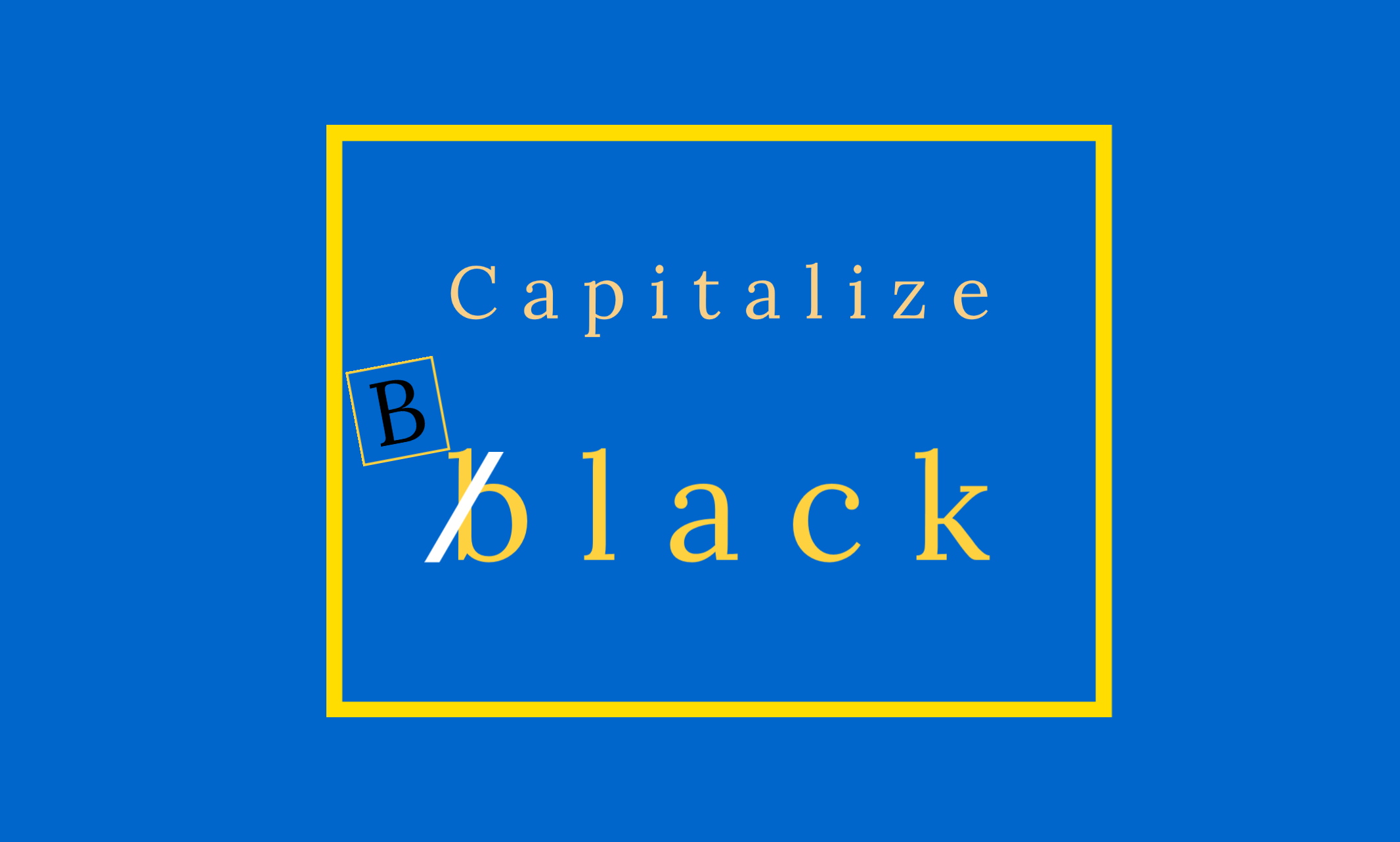
Division of Strategic Marketing and Communications updates reference to Black faculty, staff and students in UMKC style guide
Listening to feedback from members of our campus community, the UMKC Division of Strategic Marketing and Communications (MCom) changed its writing style guidelines to capitalize the ‘B’ in Black in reference to Black people, history and culture.
To capitalize or not to capitalize Black has been an ongoing discussion in cultural, academic and journalistic circles for many years. As the Black Lives Matter movement nationally has heated up that discussion, the UMKC marketing and communications staff, took note.
And decided to make a change.
The Associated Press (AP) Style Guide, the bible of writing and editing rules for most news and communications organizations, including MCom, has long called for lowercase “black” when referring to Black people, history and culture.
However, newspapers, journals, TV news programs and many companies have slowly begun the shift to capitalizing that reference over the years, more so in recent weeks. The AP announced its decision to change its longtime standard on June 19, also known as Juneteenth, the day commemorating the official end to slavery in the United States.
UMKC Law Professor Jamila Jefferson pointed out that trend, in a recent interview with MCom about some of her research.
MCom conducted some quick research and took the pulse of staff members. People noted some key developments:
Many large newsgathering organizations across the country -- USA Today, the LA Times, CNN, The AP and NBC, to name a few – have made the decision to capitalize.
Several journalists and scholars have called for AP to change its style guide in recent years. They announced the change on Friday, June 19.
This week, the influential National Association of Black Journalists announced that its plans to update its own guidelines.
“Many on our staff cited excellent reasons to make this shift,” said Anne Spenner, vice chancellor of Strategic Marketing and Communications. “Given our university’s desire to listen, learn and lead when it comes to matters of diversity and inclusion on our campus, this change makes sense for UMKC.”
Learn about the values of UMKC
Jun 23, 2020
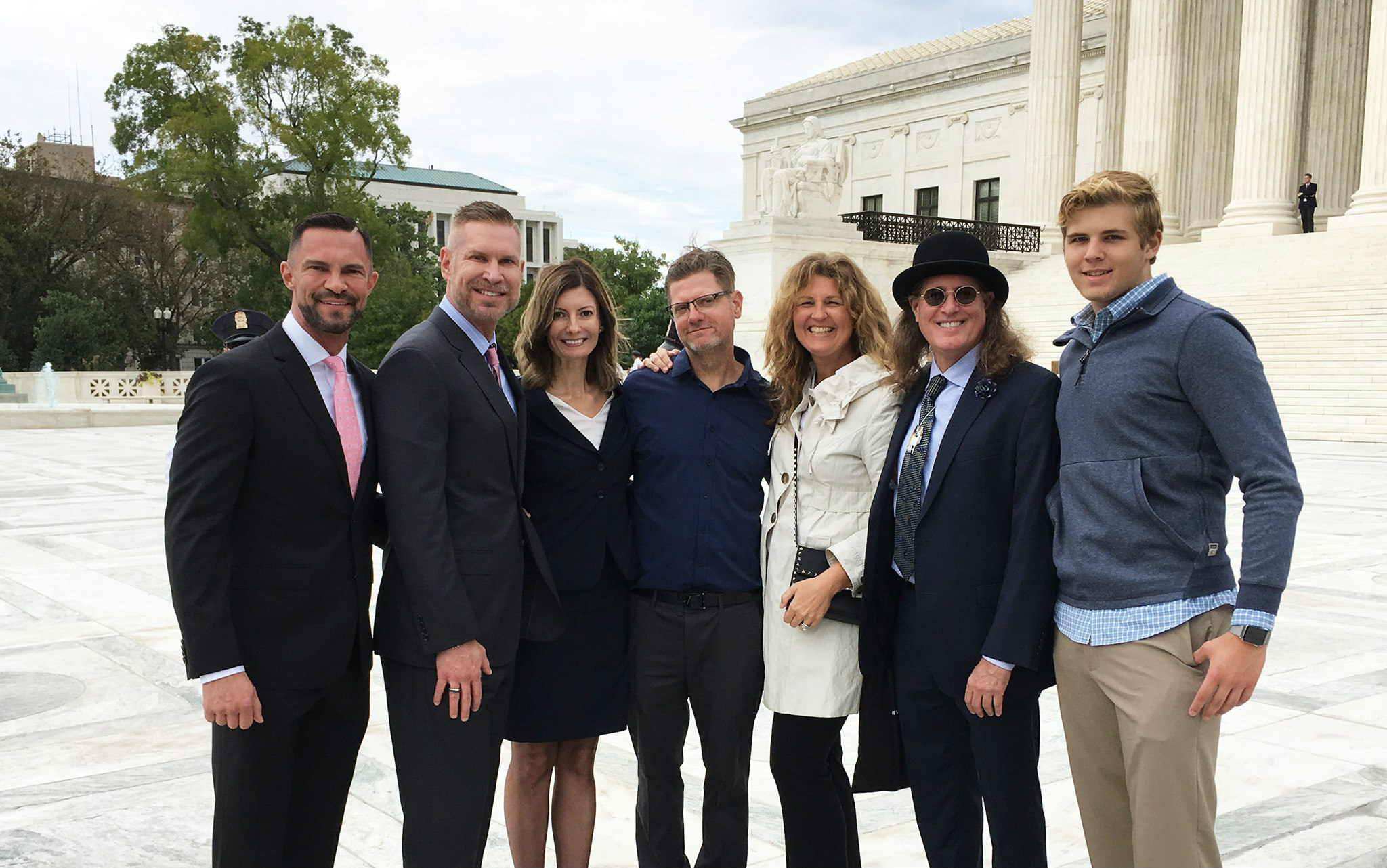
Melissa Zarda (B.A. ’02, M.A. ’07) stepped in to advocate for equal protection in workplace discrimination
Don Zarda worked at a skydiving company in Long Island, New York where he would accompany customers on tandem jumps. In an effort to make a female customer more comfortable, he mentioned that he was gay. Following the jump, the customer’s boyfriend complained and Don was fired. He sued and pursued the case, Zarda v. Altitude Express, through the courts until his death BASE jumping in 2014.
His sister, Melissa Zarda, who had been at his side during the years following his dismissal, took up the mantle that recently resulted in a Supreme Court ruling that sexual orientation falls within Title VII of the Civil Rights Act of 1964 that determined people could not be discriminated against based on race, color, religion, sex or national origin. Melissa never wavered in her commitment to advocate for her brother and the LGBTQ community.
"This case was so important to my brother that we owed it to him to pursue it in his honor,” Melissa says. “I heard from people all over the world who had been fired for nothing more than being themselves at work. People lost their paychecks, the ability to provide for themselves and their families, their health insurance and more.”
Don Zarda BASE jumping from a tower in Kuala Lumpur
Before Don filed his case, Melissa was not aware how common LGBTQ discrimination was in the workplace.
“I was totally ignorant of the plight of LGBTQ people in the workplace,” she says. “I assumed federal protections were already in place under Title VII and couldn't be challenged.”
While she was active and supportive in Don’s case, her role changed after his death. Despite her drive to achieve his dream of the courts supporting LBGTQ equality, her devotion to her brother and her conviction that workplace equality was essential, she was not confident that they would win.
“I hate to say it, but there were times that I worried that we’d lose and I thought that would be tragic.”
As she watched the oral arguments during the Supreme Court hearing, she began to gain hope.
“I noticed during oral arguments that (Associate Supreme Court Justice) Neil Gorsuch was really engaged,” Melissa said. “He was asking questions and paying attention and taking the time to listen to both sides. Also, we were represented by the best of the best. Our attorney was Pam Karlan, co-director of the Supreme Court Litigation Clinic at Stanford, and we were also supported by a talented team at the ACLU.”
Melissa Zarda addresses the press after the verdict
Despite her years of work and devotion to her brother’s cause and the strength of their team, Melissa was overwhelmed when the verdict was in their favor.
“My heart was racing. I can’t really put it into words. My brother had been dealing with this case for a few years already before he died and it took a huge toll on him,” she says. ”I took over along with his partner, Bill (Moore), in 2014. We hit many snags along the way, but we kept going. It has been a long journey, and to see it all end at the highest court with a fair ruling was euphoric.”
Melissa felt as if Don were with her when she heard the news.
“I feel he was looking down on us and that he was proud that we didn’t give up,” she says. “He would have been wearing his biggest smile and would have given me one of his bear hugs that I miss so much.”
Rather than resting, Melissa is taking advantage of the momentum of the decision to pursue further LBGTQ protection.
Don Zarda and his partner Bill Moore
“I think it’s important to push Congress to pass the Equality Act to fully protect LGBTQ people — and all people — from discrimination in all contexts covered by federal civil rights law. The reality is that many LGBTQ people face harassment and mistreatment in their daily lives.
LGBTQ people of color — particularly Black transgender women — face even higher rates of discrimination and too often violence. LGBTQ people should be protected from discrimination across all areas of life, including health care, education, housing and more. The Equality Act would address that discrimination. We need to pass it now.”
Jun 23, 2020
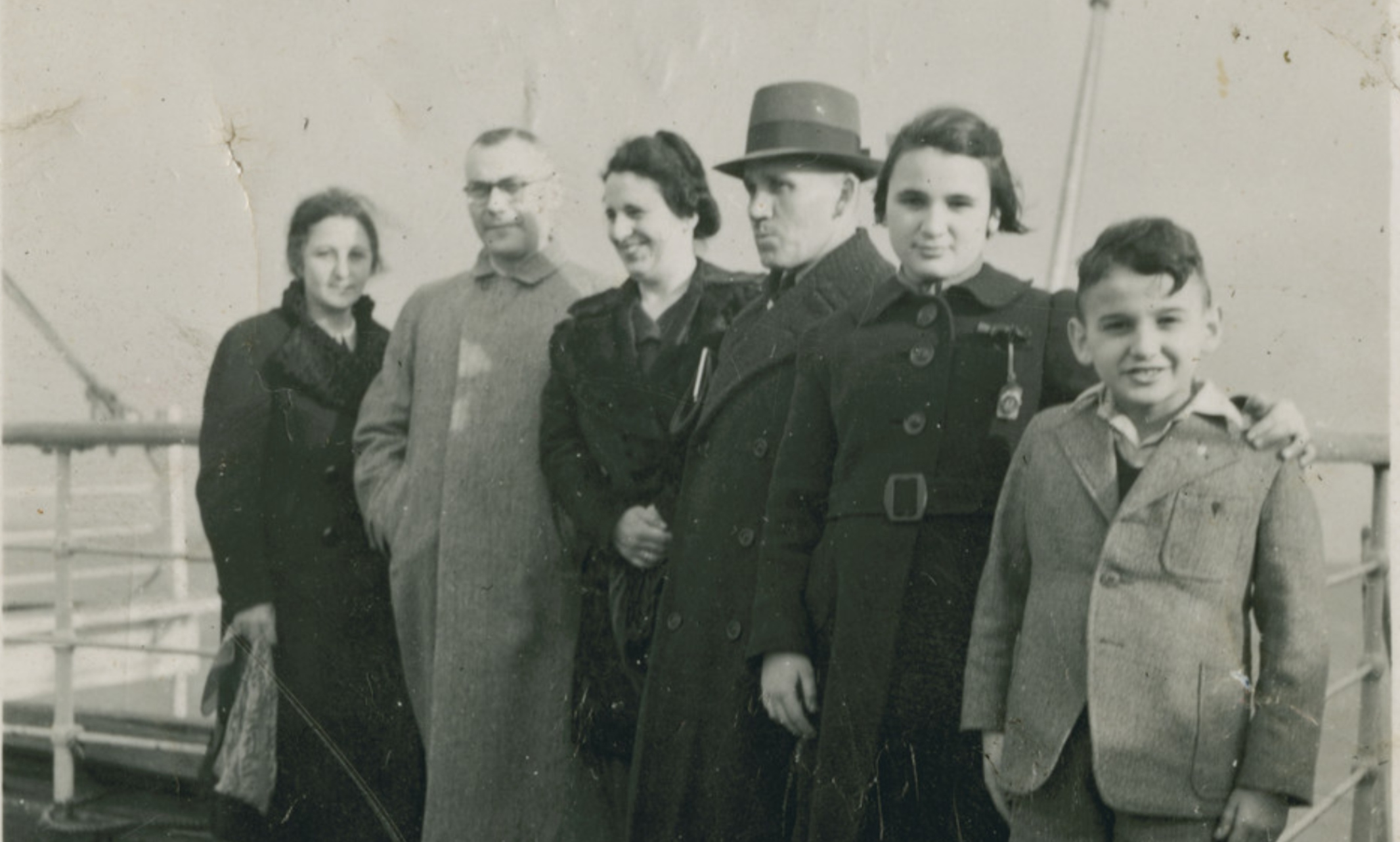
Family with strong UMKC ties furthers future success
Doris Edelman fled Germany with her family when she was a teenager as violence began to build against Jewish citizens. She instilled the value of education into her three sons, Mark, Alan and Ron, who have established an endowed scholarship in her name.
“My mother was the principal influence in our lives,” Mark Edelman, J.D. ’75, says of he and his brothers Ron, J.D. ’82 and Alan. “She was German, so there were certain cultural imperatives that worked their way into our home. Her expectations for us were high.”
Doris Edelman’s family left Germany in 1938 following Kristallnacht, or “the night of the broken glass,” in which paramilitary troops demolished synagogues and Jewish-owned businesses and buildings. The event was a precursor to the rise of the Nazi party and the “final solution” to eliminate the Jewish race. Doris’ family sailed to Cuba on the S.S. Rotterdam, one of the last ships bringing refugees from Europe that was allowed to dock in the Americas.
“They were in Cuba for a year and a half before they moved to Kansas City,” Edelman says.
Edelman’s grandfather had owned a men’s clothing store with its own workroom in Germany. A cousin sponsored the family’s immigration to the United States and Brand and Puritz, a Kansas City Garment District manufacturer, offered his grandfather a job.
“My mother was the principal influence in our lives.” - Mark Edelman
Eventually, Doris Edelman enrolled in Kansas City University and earned degrees in Spanish and economics in 1947. Her husband, William, earned a psychology degree from the university in 1954 while supporting the family as a practicing physician.
“My mother was a very bright woman,” Edelman says. “After she graduated KCU, she translated overseas cables for Butler Manufacturing. She became the first woman vice president and partner at B. C. Christopher & Co., a securities and brokerage firm. She loved going to work and being a part of that business.”
In addition to work, education was very important to Doris.
“I wanted to be a filmmaker,” Edelman says. “She did not think that was very serious. She said, ‘Mark, you can always be a filmmaker if you go to law school, but you can’t be a lawyer if you go to film school.’
I forgot to say ‘I don’t want to be a lawyer.’ So I ended up in law school at UMKC, which turned out to be a great foundation for my career.”
Edelman’s connection to the university began years before law school.
“My parents took advantage of all the things an urban campus like UMKC can provide to the city,” he says. “My love of the theater grew from my experiences of going to the Missouri Rep while in high school.”
“When my brothers and I began to think about what we could do to honor her memory, we decided that a scholarship that would enable refugees like my mother to have an education was the best thing to do.”- Mark Edelman
Edelman founded the Theater League, Inc., a not-for-profit performing arts organization that presented the best of Broadway to Kansas City audiences for 42 years. He built the Quality Hill Playhouse and produces 12th Street Jump, a syndicated public radio show hosted on KCUR-FM 89.3, another UMKC institution.
His brother Ron and Alan’s son Alex also attended UMKC law school. The family will be recognized with the 2020 Legacy Award at the UMKC Alumni Awards ceremony which will take place in spring of 2021. Their deep and broad connection to the university contributed to honoring Doris Edelman with a scholarship.
“When my brothers and I thought about how we could best honor her memory, we decided on a scholarship that would enable refugees like her to get a college education,” Edelman says. “I think she’d like that. She was proud of us and I think she’d be proud of our association with the university.”
For more information about scholarships, please contact Financial Aid and Scholarships.
Jun 23, 2020
Coding academy is backed by the Full Employment Council and the University of Missouri-Kansas City
The UMKC School of Computing and Engineering and Full Employment Council created this partnership to deliver a 21st century workforce in Kansas City. Read the Startland News story.
Jun 23, 2020
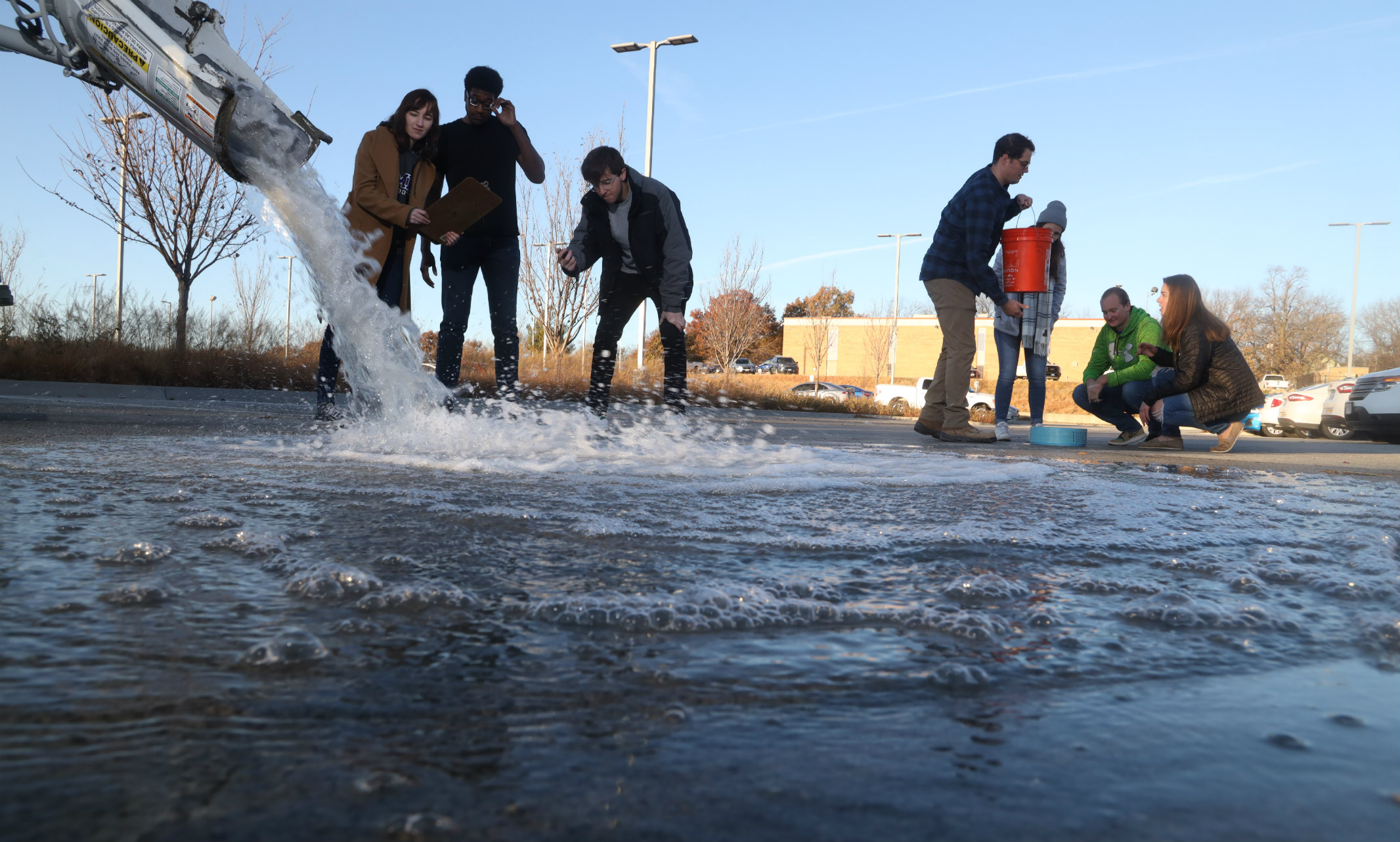
How a UMKC researcher is paving the way for sustainability
Our global temperature is on the rise, oceans are warming and extreme weather events have been steadily increasing. According to NASA, “the current warming trend is of particular significance because most of it is extremely likely (greater than 95% probability) to be the result of human activity."
Kevern with students makingconcrete in an SCE lab.
Luckily, humans from the UMKC School of Computing and Engineering are developing ways to make their respective areas of expertise more environmentally friendly. John Kevern, Ph.D., professor and civil and mechanical engineering department chair, has been working with SCE alumni as well as Kansas City architects, builders and concrete companies to increase the amount of pervious concrete used around the city.
Pervious or permeable concrete is a porous mixture of cement, water and coarse aggregate. The beauty of the lumpy, holey concrete that has the consistency of a rice cake is that it serves as pavement and stormwater mitigator in one. It can also help prevent floods, control erosion, allow groundwater recharge and improve water quality through filtration.
Bonus: Pervious concrete doesn’t freeze over like normal pavement. It’s less slippery since the water has a smaller surface area to freeze on. A recent $55,000 EAGER grant – which support exploratory work in early stages with opportunity for high risk-high reward – from the National Science Foundation allowed Kevern and SCE students to experiment with de-icing and slip and fall.
“For society, from an equity and access perspective, any surface where we can reduce the chance of a slip and fall makes both a safer surface and allows us to use less de-icing agents like salt. Salt is not only bad for the environment but it also reduces the lifecycle of concrete,” Kevern said of his NSF research.
Kevern, who is a member of the advisory group for the American Public Works Association’s Sustainable Stormwater Task Force, is also researching a greener way to produce the cement used in concrete by reducing the amount of carbon dioxide emitted throughout the process. Using recycled ingredients — like the byproducts of coal burning power plants or iron and steel production — in the cement mix drastically lowers CO2 emissions.
Kevern ran the numbers on CO2 in Kansas City and found that the city used 2.5 million cubic yards of concrete in 2018, which equals 663,375 tons of CO2. The average Kansas City vehicle is responsible for 10.690 pounds of CO2 each year.
That means that if you use a mix of concrete that’s made of 35% recycled byproducts, the CO2 reduction would be equivalent to taking 42,000 cars off the road. Increase to 50% recycled byproducts, and the equivalent is 60,000 vehicles.
“The production of cement for concrete is somewhere around 8-10% of the human-produced carbon dioxide in our atmosphere — there are many other things that are more but it’s not insignificant — anything we can do to replace cement and reduce the CO2 footprint of our concrete is helpful from a climate change perspective,” Kevern said.
Concrete and Beyond
The increased greenhouse gases can also account for an increase in extreme weather changes. In Kansas City, stormwater and flooding have raised an early challenge.
"Building physical models is nearly a lost art. When computers came around, everyone thought they’d take the place of physical models, but unfortunately they aren’t able to predict flooding as accurately.”—John Kevern, Ph.D., UMKC professor and civil and mechanical engineering department chair
Kevern regularly works with KC Water, the city department responsible for accessibility and quality of water services around the city, including School of Computing and Engineering alumni like Tom Kimes (B.S.C.E. ’87), manager of stormwater engineering, and Jose Lopez (B.S.C.E. ’15), watershed planner.
KC Water recently installed several different types of concrete, including contracting Kevern to install pervious concrete, in the parking lot of their offices to test the long-term benefits of each. Kimes and Lopez are also working on a way to combat the longstanding stormwater and sewer issues that have plagued the city for years and will be exacerbated by the added rainfall that climate change brings.
After several years of repeated flooding from nearby Indian Creek, the City of Kansas City, Missouri, bought the land and demolished the strip mall that stood at 103rd Street and Wornall Road. The mall was home to Coach’s Bar & Grill, where two employees had to be rescued from the roof by firefighters during severe flooding in 2017.
Kevern (left) regularly partners with SCE alumni at KC Water to examine stormwater and sewer issues that have affected the Kansas City area for years. Here he is pictured with watershed planner Jose Lopez (B.S.C.E. ’15, center) and manager of stormwater engineering Tom Kimes (B.S.C.E. ’87, right) with a model they are constructing inside the KC Water building to identify various flood risks and ways to combat them.
Now, the city, along with KC Water and the Army Corps of Engineers, are building a 70 feet long by 25 feet wide physical model of the area inside a building downtown, to better identify the flood risks and how to combat them.
It’s an innovative approach. Kimes says not many places are able to produce physical models and having two experts in the city — UMKC adjunct professor Don Baker and associate professor Jerry Richardson — is especially valuable. Lopez has been working on the model since its inception – he started working on the scaling for the project while still a student at UMKC.
“Instead of something to be protected from, I’d like to see us embrace rivers as the valuable parts of our ecosystem that they are.”—Tom Kimes, B.S.C.E. ’87
Kevern agrees, “Building physical models is nearly a lost art. When computers came around, everyone thought they’d take the place of physical models, but unfortunately they aren’t able to predict flooding as accurately. I’d estimate there are less than a handful of places that have people with the knowledge and technique needed to build physical models.”
That’s not to say computers are totally out of the picture. Lopez says they will “flood the model several times to get the flow patterns, then make the computer model reflect those.”
Once the research on flooding is done, the area will become a park complete with pervious concrete, green space and information about Indian Creek.
Focusing on Stormwater Research
In May, Kevern and the School of Computing and Engineering will team up with KC Water and several other stakeholders – including FEMA, Unified Government of Wyandotte County and the Army Corps of Engineers – to launch the Center for Urban Stormwater Research. The first project the center will focus on is a FEMA grant exploring ways to educate the public about the risks of flooding.
Kimes hopes that Kansas City is able to manage stormwater in a way that leads the nation and turns the city’s “wild rivers” into community assets even with added rainfall.
“Instead of something to be protected from, I’d like to see us embrace rivers as the valuable parts of our ecosystem that they are,” Kimes says.
Jun 22, 2020
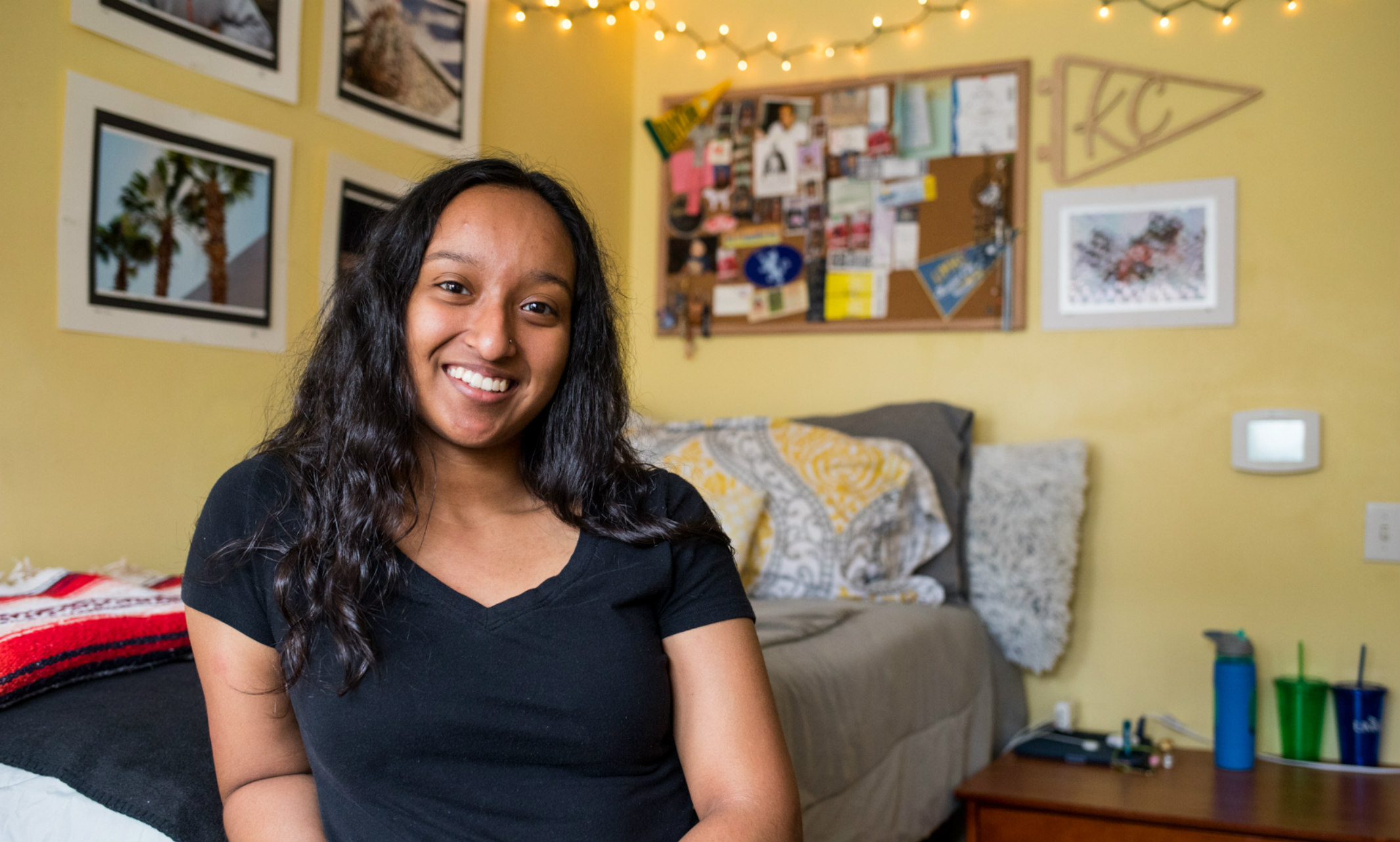
Residential Life and Dining Services take extra precautions due to the pandemic
One of the most rewarding and memorable parts of the college experience is living on campus and forming friendships with other students.
Considering that importance with the pandemic top of mind, here are seven steps UMKC is taking at the beginning of the fall semester with campus housing and dining services to ensure students have a fun but safe place to live, learn and grow.
1. Guest policy
Guests will be limited to residents from the same building, caretakers and those assisting with move in and move out only. Roommates and suitemates must establish their own visitation rules for their room/apartment.
2. Room configuration
Furniture will be arranged to maximize distance between individuals. Additionally, beds may not be bunked to ensure adequate distance is being maintained. However, lofting will still be allowed in Oak Street Residence Hall.
3. Community spaces
Study and community lounges will be closed at the beginning of the semester. Kitchens will remain locked but available for use by checking out a key at the building’s front desk; cleaning supplies for residents will be provided with the expectation that they clean up after each use. Elevators will be limited to two people to allow for physical distancing. Lobbies, access doors, laundry rooms and public restrooms will have additional cleanings.
4. Equipment checkout
Front desk services are limited to essential operations to reduce traffic flow. Board games, kitchenware, sports items, pool cues and other items are temporarily suspended.
5. Dining service
Service at all locations, both residential dining and retail dining, will be either directly served or pre-packaged. There will be no self-service. On-premise dining will be limited to 50% of seating capacity at all locations.
6. Modified dining hours
Dining Center hours will be modified to allow for more frequent cleaning and disinfection of the dining area between meal periods, while offering longer periods of time for students to access the full breakfast, lunch and dinner offerings.
7. New app
A new app will allow students to place orders, complete secure payment using their dining plan or payment card information and schedule pick-up times at all locations, which are moving toward contactless entry and transactions. FreedomPay at all locations currently accepts Apple Pay and Google Pay.
As the pandemic situation evolves, university leaders will make certain best practices are in place so students have a safe living and learning environment.
Jun 22, 2020
The Kansas City Star calls on UMKC Criminal Justice and Criminology Professor Ken Novak
Ken Novak weighs in on whether the public should have a voice in determining whether police departments allow the use of neck restraints during less-than-lethal encounters. Read more from The Kansas City Star. (subscription required)
Jun 22, 2020
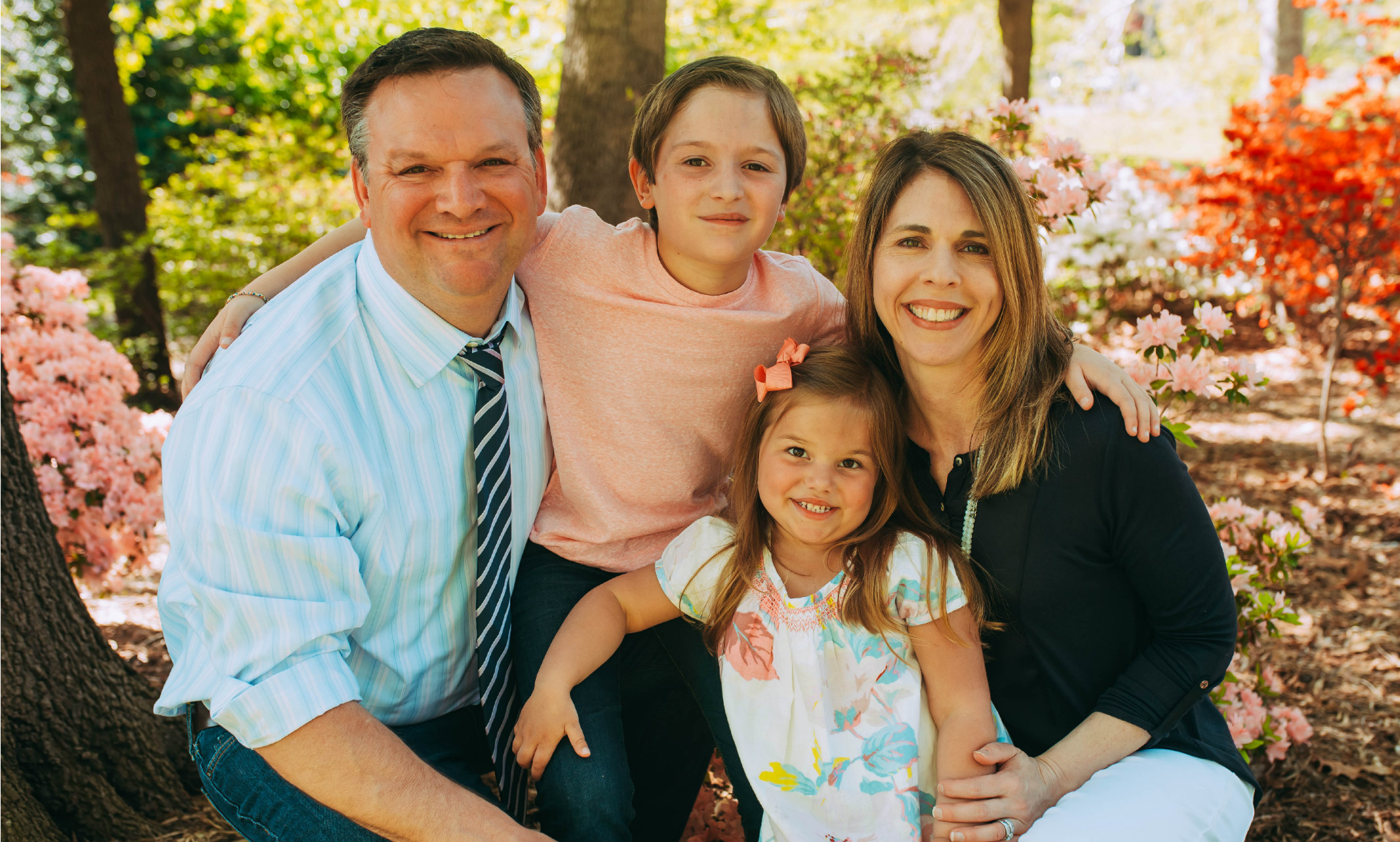
Checking in to see how our UMKC community is managing the highs and lows of sheltering in place
UMKC Provost Jenny Lundgren is sheltering in place with her 5-year-old daughter, 10-year-old son, her husband and their dog. As life takes steps back toward “normal,” their household is beginning to resemble pre-COVID activity.
“My husband goes to work each day and my daughter is back at daycare, so during the day it’s me, my son and our dog,” Lundgren says. “My son spends most of his day playing [the online game] Roblox with his friends, but that will change in July when camps start up. Thankfully!”
Everyone in the Lundgren house is doing his and her share to keep things running smoothly.
“I work best when the house is organized and clean, so that’s been my contribution” she says. “My son has weekly chores and my husband does most of the cooking. We both love to work outside in the yard, so we are doing that together when we have a chance.”
"The work day doesn’t have a starting and stopping place like it used to." - Jenny Lundgren
Even while sheltering in place, home has looked very similar for her family, except the dining room became her office.
“My actual office at home has poor Wi-Fi, so I’ve spent most days in the dining room. That worked well when I was simultaneously home schooling my 4th grade son.”
While Lundgren and her family have managed to blend work and home, it can be challenging.
“The work day doesn’t have a starting and stopping place like it used to,” she says.
Still, the family is finding a way to take breaks and find joy.
“We get to the lake every once in a while, and have the opportunity to spend some time in nature,” Lundgren says. “I love hearing my daughter say, ‘This is the best day of my life!’ I’m reminded that you don’t need exciting vacations to make your kids happy.”
What are you reading?
I wish I were reading more than just emails! I try to practice Spanish on the Duolingo app every day, so that – and emails - are the bulk of my current reading. I just ordered Stamped from the Beginning: The Definitive History of Racist Ideas in America, and I’m looking forward to reading that.
What are you watching?
Bloodline on Netflix
What are you eating?
The only consistent food in my diet is a daily iced coffee with cream and sugar!
Jun 21, 2020
Diane Mutti-Burke explains the significance of Juneteenth and emancipation proclamation
“The emancipation proclamation actually didn’t free any enslaved people," said Diane Mutti-Burke. "Lincoln basically said to the southern states that he was turning the army into an army of liberation and, anywhere that the Union Army went from that point forward, they would liberate people." Read more and watch the story on KSHB's website.
Jun 20, 2020
Three questions with Diane Mutti-Burke, professor and chair of History
June 19 is celebrated throughout the United States as Juneteenth, commemorating the end of slavery in this country. Diane Mutti-Burke, professor and chair of the Department of History, is a historian of the American South and the Civil War with a particular interest in the history of slavery, women and the Missouri/Kansas border region. She discussed the history, meaning and the importance of Juneteenth.
Juneteenth recognizes a specific event in Galveston, Texas – the notification of Black people there that slavery had ended. Why is it considered a national holiday?
The Juneteenth holiday celebrates the official end of slavery in the state of Texas on June 19, 1865. President Lincoln issued the Emancipation Proclamation on January 1, 1863, but it did not immediately free any enslaved people. The order explicitly did not apply to border states like Missouri or areas of the South already under the Union army’s control. Although the Civil War formally ended on April 9, 1865 when Robert E. Lee surrendered at Appomattox, there were still Confederate forces in the field, including in the West.
Texas had remained relatively protected during the war because of its great distance from the fighting. This geographic isolation created a situation in which many enslaved Texans were unaware of the end of the war or their freedom. Union troops finally entered the state in early June 1865, and in Galveston on June 19, Major General Gordon Granger issued General Order No. 3, an emancipation order informing people of their freedom. Since the Emancipation Proclamation was a wartime military order, Abraham Lincoln and Congressional Republicans decided a constitutional amendment was necessary to permanently secure people’s freedom. The Thirteenth Amendment was ratified on December 6, 1865, legally ending slavery in the United States.
In the decades after the Civil War, African American communities throughout the U.S. organized Emancipation Day celebrations to commemorate their liberation from slavery. Many celebrated on January 1, the date of the Emancipation Proclamation, but in some states, they commemorated dates that were specific to their location, such as June 19 in Texas, known as “Juneteenth.” Juneteenth became a Texas state holiday in 1979. Black Texans migrated to other parts of the United States, bringing the Juneteenth celebration to their new communities. In recent years, Juneteenth has become an informal national holiday celebrating African American heritage throughout the United States.
“Juneteenth allows us to celebrate Black Americans’ resistance and resiliency as they fought – and continue to fight – to rectify four centuries of racial discrimination and economic and social injustice.” Diane Mutti-Burke
What can you tell us about how emancipation took place in this region?
When most Americans think about emancipation they focus on the legal or military acts that occurred on specific dates, such as Abraham Lincoln’s Emancipation Proclamation or the Thirteenth Amendment. I would encourage people instead to think about emancipation as a process – one that was as much driven by enslaved people themselves as it was by white emancipators.
Missouri’s border location and politically divided population (with white Missourians supporting both the Union and the Confederacy) resulted in a violent armed conflict between Union military forces and Confederate guerrillas, which actively engaged the civilian population. Many of Missouri’s 115,000 enslaved people took advantage of the chaos of the state’s internal civil war and struck a blow for their own freedom, running away to nearby Union military encampments or to the bordering free states of Kansas, Illinois, and Iowa. Lincoln’s Emancipation Proclamation explicitly did not apply to the border states. But over time, enslaved men, women and children continued to flood into Union military camps, forcing officers to increase protections for those who sought their aid and eventually to authorize their freedom. Many recognized that Black Missourians greatly aided the Union war effort through their labor and the information that they provided about the activities of secessionists and guerrillas, many of whom were their former owners.
Eventually, the Union army enlisted Black men to fight and Missouri men joined in large numbers. Black men fully understood that their enlistment would ensure their freedom and might result in the freedom of their family members as well.
On January 11, 1865, Missouri’s Republican-controlled state Constitutional Convention freed enslaved people in the state through an emancipation ordinance, which predated the passage of the Thirteenth Amendment by three weeks.
What are the important lessons that Americans should take from the Juneteenth celebration?
The Juneteenth holiday provides a wonderful opportunity for both reflection and celebration. The commemoration allows Americans to reflect on the United States’ long and tragic history of slavery, segregation, racial injustice and systemic inequality. It is important that we learn about and reckon with the many painful and destructive legacies of this devastating history and how it affects us still today.
This is an uncomfortable and difficult history to process and study but it is imperative that we wrestle with it. Too often people respond to issues of race as being outdated and irrelevant because slavery and legal segregation ended “so long ago,” but understanding the legacies of slavery, white supremacy and the challenges and pain that the Black community continues to encounter in the face of ongoing systemic racism and inequalities illustrate the importance of this history. At the same time, Juneteenth allows us to celebrate Black Americans’ resistance and resiliency as they fought – and continue to fight – to rectify four centuries of racial discrimination and economic and social injustice. Equally essential, the Juneteenth holiday provides a venue to acknowledge, appreciate and celebrate the profound contributions that Black Americans have made to the economic, social, political and cultural foundations of the United States.
I encourage everyone to spend today in contemplation and celebration of the long history of the Black freedom struggle and the central role that Black Americans have played in building this nation, while also reflecting on how much farther we must travel along the road toward justice and equality in order to achieve America’s promise of a more perfect union.
Jun 19, 2020
Local media outlets covered the news about the new satellite campus for the UMKC School of Medicine
Read some of the media coverage of the satellite campus in St. Joseph. Kansas City Business Journal, KCUR,
Jun 19, 2020
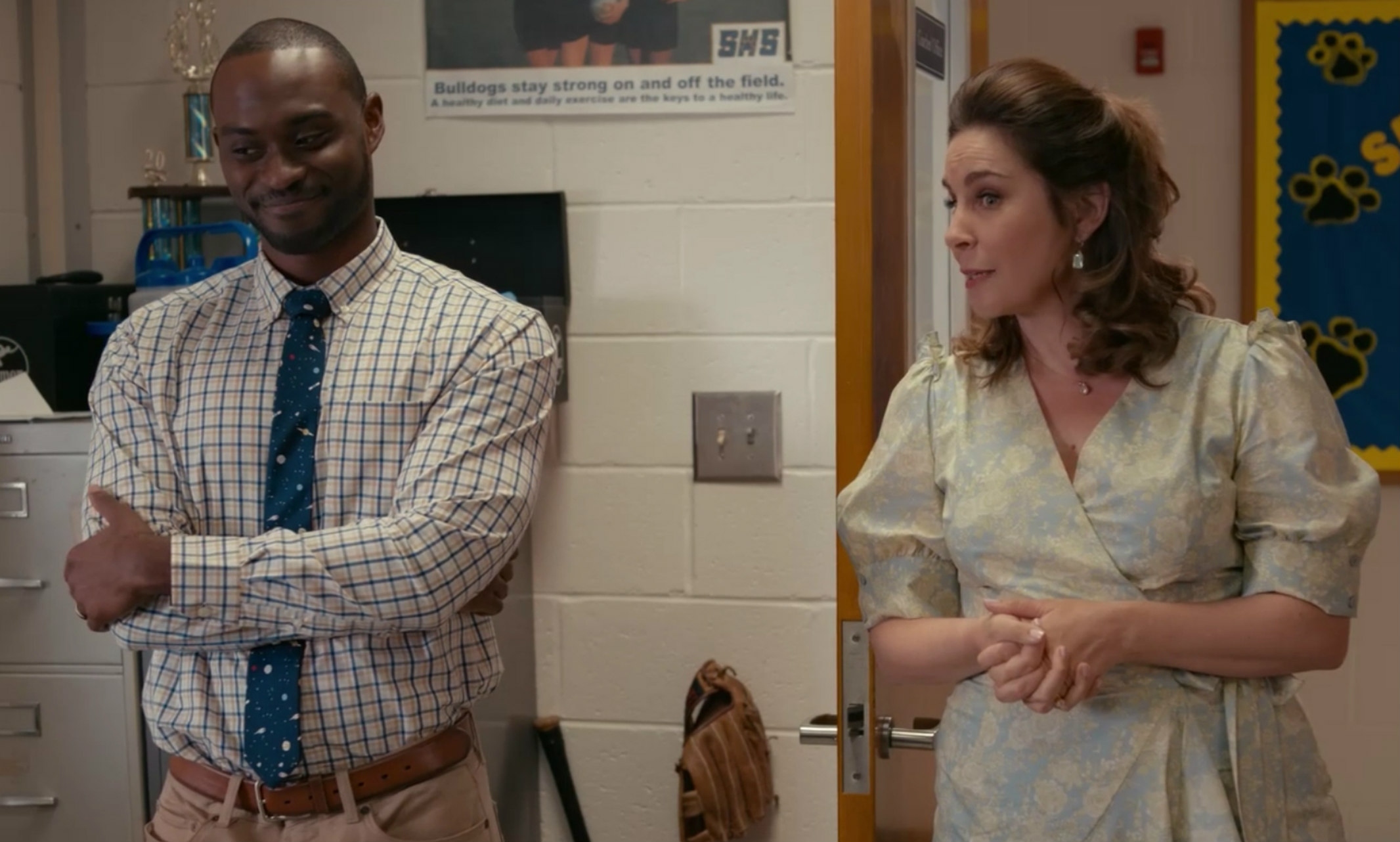
Frank Oakley III draws on his theatre training in role on "Sweet Magnolias"
We caught up with Frank Oakley III (B.A. ’14) a theatre performance grad who is part of "Sweet Magnolias" on Netflix. He spoke with us about what he's learned in the acting biz, his favorite UMKC memory and what’s next.
Frank Oakley III, B.A. '14Photo credit: Mike Senior
How does it feel to be part of “Sweet Magnolias,” one of the most popular shows on Netflix right now?
It honestly still hasn’t fully hit me yet! “Sweet Magnolias” was released on Tuesday, May 19, and the very next day we were #5 in the U.S. We kept climbing up the ranks, and by that Sunday were #1 on the world’s largest streaming platform! After holding down that spot for a few days, I think that’s when things started hitting me. To say the very least, it’s surreal to be a part of a show that so many people connected with, supported, and loved so much to get us to that point in less than a week!
Was Harlan Bixby, in "Sweet Magnolias," your first recurring role on a series? What did you learn from the experience?
Yes, it was my first recurring role on a series. I’ve learned so much from filming the first season, but the two biggest things came from the callback room and being on set.
First, I learned that you really can’t go off of how you feel you did in the audition/callback room, because it isn’t always true. I felt like I was completely bombing my callback audition — and in front of some major players in the process! I psyched myself out by getting into my head too much, but once I was able to relax, I feel like I did much better.
Then, the filming process just really affirmed how valuable my training from UMKC is. I was able to do my job, play with other seasoned actors and adapt to any changes made during the process in a quick manner.
The takeaway in both lessons: it’s all about your mental game. From the audition to working on set, you have to trust your training, trust the process and keep a strong mental game.
What are the challenges of being an actor? The benefits?
Some of the more universal challenges I’ve found as an actor are getting established, creating a name for yourself, defining what your brand is and booking work. For the most part, we as actors can have some control over those challenges, with the exception of the seemingly most important one — booking. That said, I’ve found that once I was able to define what my brand was for me, set up boundaries, and was willing to stand firm on what I mapped out, everything followed suit.
The benefits (besides booking work) are doing work that you’re proud of and believe in and getting to collaborate with some amazing people to create and play! I know it sounds like an artsy-fartsy thing to say, but man, it is real and rewarding. To be a part of a larger picture or body of work, and to share that with both fellow artists/creators and the audience, is truly a blessing and privilege.
Oakley, pictured right, with Justin Bruening in episode four of "Sweet Magnolias." Still courtesy of Netflix.
What brought you to UMKC?
It is truly a long story, but in an attempt to condense a bit: one audacious prayer, teachers and mentors believing in me, and the kindness and support of people. At the beginning of 2011, I was sitting in contemplation in my dorm room at my first college, trying to figure out whether or not I’d be truly satisfied with a career in broadcast journalism. A thought sparked in my mind: maybe acting.
I reached out to my high school debate/forensics coach, Ms. Michelle Lee, about possibly trying out acting. She sprang into action and shared with me a bucket of resources — everything from colleges with awesome theatre programs to prestigious theatre summer camps. After some research, I was considering transferring to UMKC and auditioning for the Perry-Mansfield Performing Arts School and Camp.
While waiting to see if I got accepted, I auditioned for the camp. And I got in with a partial scholarship! I couldn’t afford to pay the remaining balance, so Ms. Lee helped me sell candy bars. I knew this was a really hard hump to overcome, so I prayed “God, if this is something I supposed to do with my life, help provide a way for me to attend this camp. If I’m able to go, then I know this is what you have for me to do with my life.”
As it got really close to time to go, I was told that the rest of what I couldn’t earn from selling candy bars was covered, and that I’m heading to camp. Later in life I found out that Ms. Lee and Melinda McCrary (director of education and community programs at the Kansas City Repertory Theatre) funded the rest.
Once I got that confirmation of being able to go, and getting accepted into UMKC, that was all I needed to know. It was off to UMKC with purpose and a mission!
Oakley pictured with his future wife, Anna, in the production of Three Sisters at UMKC in 2013. Photo Credit: Brian Paulette.
Do you have a favorite memory from UMKC?
Cheesy, yes, but true: meeting my wife, Anna Oakley! (She was Anna Day at that time, B.A. '15). We met and worked together for the first time on a show “Cover of Life” in November of 2012. But our relationship actually started to bloom while we were doing a show together “Three Sisters” in October of 2013. Hands down, favorite memory.
What advice do you have for students entering UMKC?
I actually have three pieces of advice. And honestly these are for everyone, no matter what your life path is. I say these a lot, but it’s something that is extremely imperative to grasp and understand from the beginning. It will save you a lot of time, frustration, and darkness:
You are always enough, no matter what!
Don’t give up, what is for you is for you. Regardless of the circumstances or odds.
Don’t find your identity in your craft. Your worth is in who you are, and not what you do!
What other projects are you working on? Where else can we catch your performances?
As of now, there isn’t anything I’m working on, due to the pandemic. However, I will be in an episode of a series called The Underground Railroad. It is an upcoming American historical fiction drama limited series directed by Barry Jenkins. The series is set to premier on Amazon Video in the near future. I’ve had the privilege to be a part of some really amazing and special projects, and almost all of them can be found online. Feel free to go to my website at www.frankoakleythethird.com to check them out!
Jun 18, 2020

New campus in St. Joseph in partnership with Mosaic Life Care will increase rural health care
The University of Missouri-Kansas City School of Medicine is expanding its program to St. Joseph, Missouri, to address the state’s rural physician shortage.
UMKC received a $7 million grant from the Health Resources and Services Administration (HRSA) to start the new program in January 2021. HRSA, the primary federal agency for improving access to health-care services for people who are uninsured, isolated or medically vulnerable, will pay out the grant over four years.
“We are thrilled we will be able to address a critical health-care need in Missouri,” said Chancellor Mauli Agrawal, Ph.D. “This will enable more patients throughout the state to get better access to high-quality medical treatment.”
The need is great in the United States – the American Association of Medical Colleges projects a shortage of nearly 122,000 physicians by 2032, with primary-care physicians making up almost half of this shortage. And the need is especially great in Missouri: the state has 250 primary-care health professional shortage areas, including 109 of its 114 counties. It ranks No. 40 among U.S. states in terms of health.
“The disparities in care in rural areas result in higher rates of death, disability and chronic disease for rural Americans have intensified during the COVID-19 pandemic. Expansion of our medical school to the northwestern region of our state will serve to bridge this gap, knowing that students training in rural programs are three times as likely to remain in practice in those areas.” - UMKC School of Medicine Dean Mary Anne Jackson
“Missouri is facing a physician shortage in the next five years, creating major challenges for rural communities,” said U.S. Senator Roy Blunt (Missouri). “As chairman of the appropriations subcommittee that funds the Department of Health and Human Services, I started the Medical Student Education Program to ensure resources were specifically targeted toward improving access to care where it’s needed most. I am glad to see the University of Missouri-Kansas City focusing efforts on addressing that challenge by training more physicians to practice medicine in rural and underserved areas. This is great news for UMKC and the St. Joseph community.”
Typically, physicians remain in the areas where they go to medical school, and 80 percent of UMKC School of Medicine students are from Missouri and the surrounding counties, said Mary Anne Jackson, M.D., dean of the school. “The disparities in care in rural areas result in higher rates of death, disability and chronic disease for rural Americans have intensified during the COVID-19 pandemic. Expansion of our medical school to the northwestern region of our state will serve to bridge this gap, knowing that students training in rural programs are three times as likely to remain in practice in those areas.”
“I love how tight-knit communities are in rural areas. We're going to be surrounded by the environment we want to pursue a career in.” - Ashley Ayers
While the UMKC School of Medicine is known for its innovative six-year B.A./M.D. program that admits students directly from high school, it will offer a four-year M.D. program in St. Joseph open to students who have already earned a bachelor’s degree. This M.D. track option has been part of the school tradition since opening its doors almost 50 years ago.
Ashley Ayers of Curryville, Missouri, is excited to be a student in the first class of the UMKC School of Medicine in St. Joseph.
"I love how tight-knit communities are in rural areas," Ayers said. "We're going to be surrounded by the environment we want to pursue a career in."
“I am glad to see the University of Missouri- Kansas City focusing efforts on addressing that challenge by training more physicians to practice medicine in rural and underserved areas. This is great news for UMKC and the St. Joseph community.” - U.S. Senator Roy Blunt
The new program in St. Joseph will expand the UMKC School of Medicine M.D. program by adding 20 students in St. Joseph to each cohort of about 100 students in Kansas City, said Steven Waldman, M.D., J.D., program director and principal investigator on the grant, and vice dean and chair of Humanities at the UMKC School of Medicine. The co-investigators on the grant are Michael Wacker, Ph.D., associate dean of academic affairs, and Paula Monaghan-Nichols, Ph.D., associate dean of research administration, both from the UMKC School of Medicine. The four-year program eventually will allow the UMKC School of Medicine to train 80 additional medical students.
“The receipt of this federal grant, as well as the partnership, will allow the UMKC School of Medicine to expand our mission of training superlative physicians and health-care professionals to care for our most vulnerable populations,” Waldman said. “The addition of the UMKC School of Medicine’s St. Joseph campus will greatly enrich rural health-care education for our students.”
In addition to the grant, the expansion is possible because of a partnership with Mosaic Life Care, located in St. Joseph. Mosaic is one of the largest private rural primary-care networks in the U.S. and a member of the Mayo Clinic Care Network. Students will be able to learn and train in Mosaic’s rural healthcare network.
“This is an exciting opportunity for Mosaic to become an academic health care provider in the region," said Davin Turner, DO, chief medical officer of Mosaic Life Care. "As Mosaic has expanded into Maryville and Albany, we look to broaden the scope of health-care services to ensure the long-term sustainability of high-quality health care in the communities we serve. Innovative partnerships like this with UMKC help us address rural health care gaps in our area.”
Here's what student space looks like at the new UMKC School of Medicine at Mosaic Life Care in St. Joseph, Missouri.
Other partners:
Truman Medical Centers, the primary teaching hospital for the school, has a mission dedicated to providing public health and specialty services for those with financial, health or insurance issues that limit access to care in Kansas City. Students, residents and faculty who are based at Truman in Kansas City will be able to learn and teach at Mosaic in St. Joseph and collaborate on care for patients.
UMKC Health Sciences District is a partnership of a dozen health-care entities including four UMKC health professions schools. This further expands the district’s reach into rural health care.
UMKC STAHR (Students in Training, in Academia, Health and Research) Partnership Program is committed to increasing the number of students from educationally and/or economically disadvantaged backgrounds who are prepared to enter, persist and graduate from a UMKC health sciences degree program. STAHR serves as a mentorship resource to students.
UMKC has a successful track record of creating rural health education programs in Missouri. The UMKC School of Pharmacy includes satellite campuses at the University of Missouri in Columbia and Missouri State University in Springfield.
Jun 18, 2020
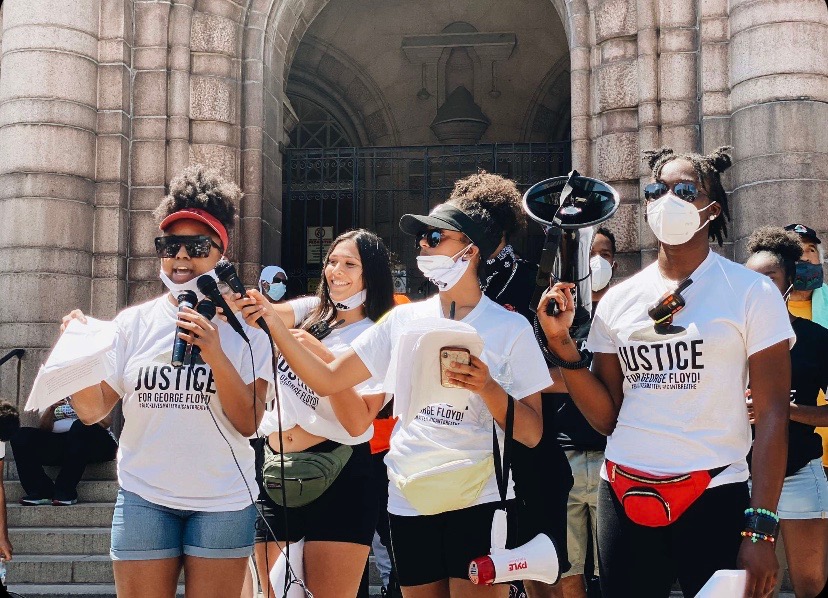
Education senior Daishanae Crittenden incorporates her passion for teaching into her activism
School of Education senior Daishanae Crittenden has a clear idea of how she wants to structure her future classroom – as a team. Her passion for teaching and her want to help shape the lives of her students fuels her activism in the community. Though she’s only had practicum teaching experience so far, she’s already hard at work showing her future students that she’s advocating for them not just through their academics, but also through social justice. This is her story.
Why did you choose to attend UMKC?
I knew I wanted to get out of St. Louis, but I didn’t want to go too far because I wanted to be able to come back and visit my mom. My mom is like my best friend. She’s one of my biggest supporters. Kansas City is similar to St. Louis – just a little smaller; and UMKC isn’t small but it isn’t too large either. Plus, in the School of Education, the classes are smaller. I was able to get out and work in the field and get practicum teaching experience earlier than I would at a larger school.
"I want my future students to see that I did this, that I’m fighting for them. We have to fight for things to be better for future generations."
What drives your passion for wanting to be a teacher?
Growing up all my teachers told me I would become a teacher. My mom was a teacher for many years. She instilled the value of education in me. I’m also the oldest of five; I have four younger brothers, so teaching kind of came naturally. I denied it for a long time but eventually, I accepted it. I love kids. I don’t care what grade I teach; I just know that I want to teach children and be a part of shaping their lives.
What other student activities are you involved in at UMKC?
Being in education doesn’t give you a lot of free time because I’m doing practicum work in the schools. I was part of the student government at the School of Education, and then I also participate in NAACP and The African American Student Union when I do have time.
"Our protest was about unity. It was about all of us being on the same team; we are fighting for the same cause."
Speaking of which, tell me about the large protest you were a part of organizing in St. Louis.
That was so exciting. I still can’t believe I did that.
It was me and three friends I went to school with. It was right after the murder of George Floyd. I remember waking up one day to a bunch of texts in our group chat and we were all talking about how we need to do something. We couldn’t just sit by and do nothing, and there hadn’t been anything organized by women in our city and we need to hear women’s voices too. So we came up with the idea to have a protest. I was kind of nervous about it because I’ve never organized a protest before.
Wow! I wouldn’t have guessed that. From the media coverage and feedback, it seemed really organized. How long did it take you to organize?
We pulled it off in like 8 days, so there were a lot of long nights. We made the flyer and posted it and, with all of our connections, people started sharing it on Facebook.
We had eight speakers, including an educator, a Pride representative, a speaker from the first Black Lives Matter movement in Ferguson, Cori Bush, who was a campaign surrogate for Senator Bernie Sanders, and a local pastor. We had a lot of people who wanted to speak but those are the ones we chose.
How did you narrow down your choices for speakers?
Each of the speakers were vetted. We shared a Google Form for potential speakers to complete and let us know what they wanted to talk about, and then we did Zoom interviews with the people we were interested in hearing from. We also sent follow-up letters to let everyone know whether or not they were selected. During the protest, we strategically placed our speakers in a certain order. The first group of speakers spoke prior to the march at City Hall to inspire and motivate the protestors, and the second group of speakers spoke at the downtown St. Louis Police Department to further discuss the deeper systemic issues within our country and why we are fighting this fight.
Some people already had scripts written and submitted them with the Google Form, but we asked for final copies of everyone’s script closer to the event because you just never know what someone will get on the mic and say. We didn’t want any surprises, and we didn’t want anyone to say anything that might incite violence.
The attention to detail is impressive. How were you able to ensure it remained peaceful the entire time?
We really made sure everyone knew that it was going to be peaceful. We couldn’t say that enough. We included that in everything we put out. And people who know me know that I don’t like violence or drama. It’s all about how you present yourself to the public, so people know that’s not what I’m about. More importantly – and I know not everyone is religious – but I have faith in my God and He had us.
We marched from downtown City Hall to the police headquarters without any problems. We didn’t want to agitate the officers and meet anger with anger, but we did make sure we had someone there to read everyone their rights before we started walking. People also donated bail funds in case we had to get anyone out of jail.
Our protest was about unity. It was about all of us being on the same team; we are fighting for the same cause.
"Growing up all my teachers told me I would become a teacher. My mom was a teacher for many years. She instilled the value of education in me."
Circling back to teaching, how do you apply the lessons you’ve learned at the School of Education to your activism?
In education, you learn to work with people from different backgrounds but with similar interests and outlooks. We did that with the protest, and I want my classroom to be structured like that. I want my students and me to work together and win together, and I never want them to feel like they can’t come and talk to me. I want my future students to see that I did this, that I’m fighting for them. We have to fight for things to be better for future generations.
Protest organizers left to right: Bersabeh Mesfin, Natasha Jain-Poster, Brooke Jones, and Daishane Crittenden
Lastly, what has this experience taught you?
I learned that I am capable of leading a crowd. Nearly 5,000 people showed up and we led them. I also learned that it’s OK to be flexible and wing things. You can’t micromanage a protest, just like you can’t micromanage a classroom. You have to just take things one step at a time.
Half the people that showed up were allies, which goes to show that skin color is an excuse. So is age. We had babies walking with us! This protest was all-inclusive. We tried to make sure everyone was represented and felt that Black lives matter, Black trans lives matter…Black people matter. We had an ASL interpreter signing everything, as well, to make sure the deaf community knew what we were saying. It was an amazing experience; I still can’t believe I did that.
People have been asking when we’re going to plan another one and we keep saying we need a minute to breathe. This took a lot out of us. It’ll have to be in the next month or so, though, because we all attend different universities across the country, and we’ll have to go back to school soon.
Of course, I’m at UMKC, one of the girls goes to Xavier University, which is an HBCU in Louisiana; one attends the University of Miami and one attends the University of California-Irvine. Had it not been for COVID, we wouldn’t have been able to pull this off. We just all happened to be home because the universities closed.
Jun 18, 2020
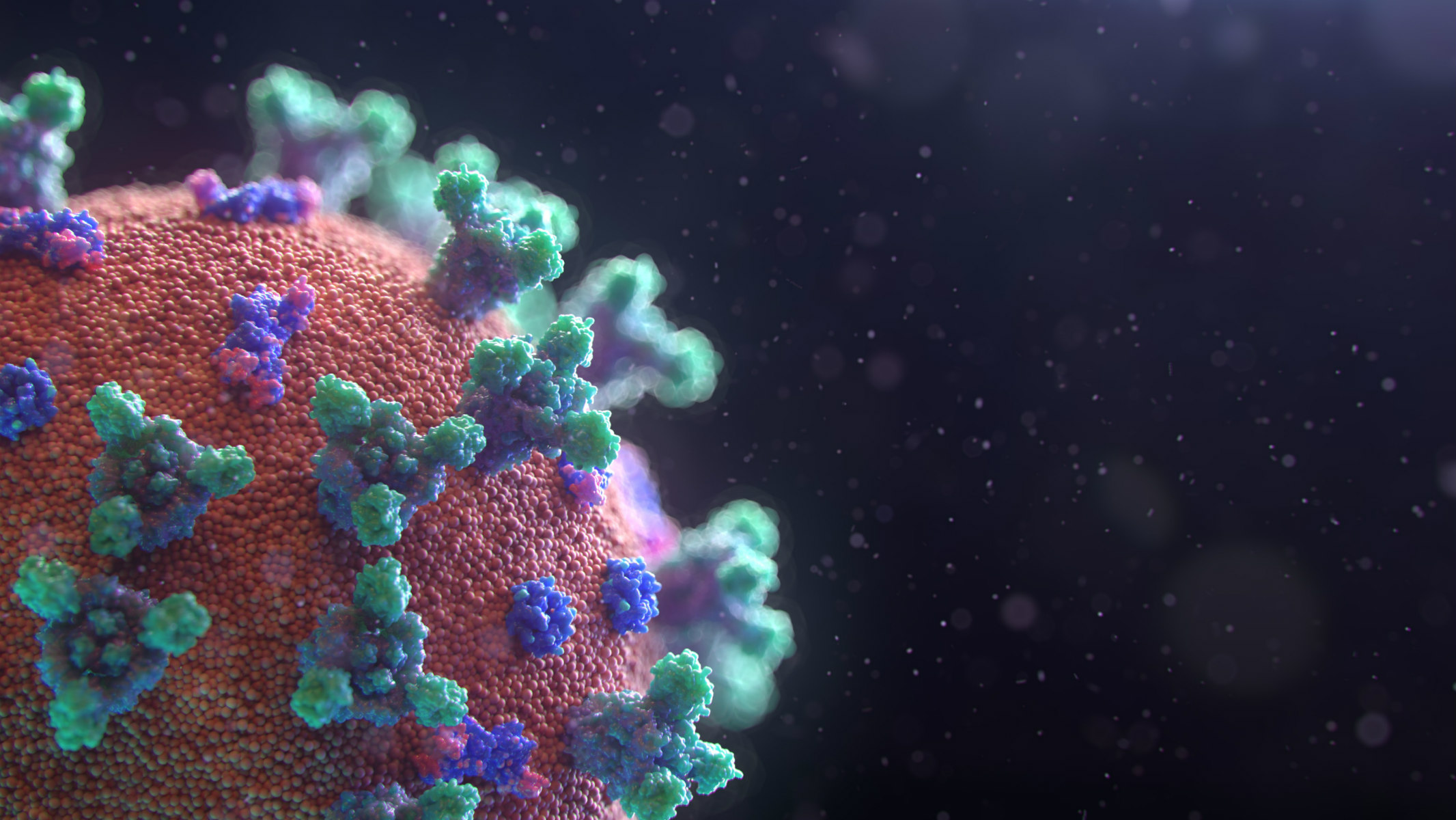
The National Science Foundation awards UMKC nearly $200,000
For scientists to develop a successful vaccine to fight COVID-19, they must understand the structure of a virus and how it attacks human cells. The National Science Foundation (NSF) recently awarded UMKC researcher Wai-Yim Ching, Ph.D., $199,640 to identify the cell structure of components of the virus. This is the university’s first national grant directly for COVID-19 research.
“In early March, I was reading a paper published in a science magazine about the virus’s structure,” says Ching, who is a Curator’s Distinguished Professor in the College of Arts and Sciences. “I thought I might be able to do some calculations.”
Within two weeks, he had some credible preliminary results. About the same time, NSF made a special call for requests. He submitted his early finding in a five-page proposal that he developed with his assistant, Puja Adhikari, Ph.D., a recent UMKC graduate and postdoctoral fellow.
“Within five weeks, we had a decision,” Ching says. “That’s very fast – and we were very happy.”
Understanding the structure of the virus through large-scale computer modeling will pave the way for highly efficient vaccine development and antiviral drug design, potentially at a lower cost. To identify accurate data on the structure of the virus, Ching will work with Adhikari, undergraduate students and external collaborators.
“The support of the Office of Research Services and Research Support Services was significant. It would have been difficult to submit our request so quickly without them,” Ching says.
Vice Chancellor for Research Chris Liu, Ph.D., says the research targets the structure and properties of a crucial COVID-19 protein using large-scale computational modeling and is exactly the type of research that the UMKC and the upcoming NextGen Data Science and Analytics Innovation Center (dSAIC) are designed to address.
“Dr. Ching will be providing critical data that could advance the development of a COVID-19 vaccine,” Liu says. “We are excited that his research will contribute to unlocking the complexities of the virus’s structure.”
Chancellor Mauli Agrawal sees the NSF’s support of Ching’s research as a harbinger of the growing success of the UMKC research enterprise.
“We are equipped to provide cutting-edge research by analyzing massive amounts of data, thanks to the research infrastructure development including the upcoming dSAIC. The center will continue to meet current and future demands from the public and private sector and develop solutions for our most critical challenges.”
Ching is already immersed in the research.
“This research is very important,” Ching says. “We need to roll up our sleeves and get working. There is no time to waste.”
Jun 17, 2020
Selections based on demonstrated research excellence and ability to communicate
Three members of the University of Missouri-Kansas City faculty were among the 15 2020-21 Presidential Engagement Fellows introduced today by University of Missouri System President Mun Choi.
The announcement came at the University of Missouri Board of Curators meeting. Presidential Engagement Fellows represent the UM System and share their research discoveries and expert knowledge with Missouri citizens in every county.
This year’s UMKC Fellows are:
Jamila Jefferson-Jones, associate professor, School of Law
Jefferson-Jones teaches courses in Property, Real Estate Transactions and Professional Responsibility. Her scholarship reflects her intellectual interest in theories of property and ownership as well as in property and wealth attainment by communities and groups on the margins of society. Her recent work has three strands: the interplay between and among sex, race, status and property; the intersection of property and criminal justice theory; and the regulation of the housing sector of the sharing economy. She is a graduate of Harvard College and Harvard Law School, where she was an executive editor of the Civil Rights-Civil Liberties Law Review and delivered the graduate English oration at the university’s 346th commencement.
Joey Lightner, assistant professor, School of Nursing and Health Studies
Lightner is director of the Bachelor of Science in Public Health Program at the school. The program combines urban-focused coursework in health policy, health and wellness, health program development and population health outcomes, to prepare students for a wide variety of careers in public health. His research is focused on increasing physical activity for large populations. His current projects attempt to understand how to improve social relationships that may lead to improvements in physical activity behavior.
Joan McDowd, professor and chair of Psychology, College of Arts and Sciences.
McDowd serves as director and advisor for Gerontology programs. Her research interests are in cognitive aging, particularly in attention and memory processes. Although primarily interested in healthy aging, she also applies methods from cognitive psychology to understanding cognition in stroke, Alzheimer’s disease and Parkinson’s disease as well as in severe mental illness. She was awarded the 2017 President’s Award for Community Engagement, which recognizes faculty who are involved in exemplary engagement activities such as volunteerism, service-learning, educational programming and outreach.
“The Presidential Engagement Fellows are among our best scholars and are widely respected by their peers," Choi said. "This group also demonstrates the breadth and depth of the expertise among our faculty. I’m excited as we welcome them. This is yet another example of our commitment to serving the state of Missouri and improving the lives of our fellow citizens.”
Faculty members were selected based on their demonstrated excellence and their ability to communicate their research to the public.
Bookings for the new class of speakers will begin in August. For more information, please visit: www.umsystem.edu/forms/pef-speaking-request-form.
Jun 17, 2020
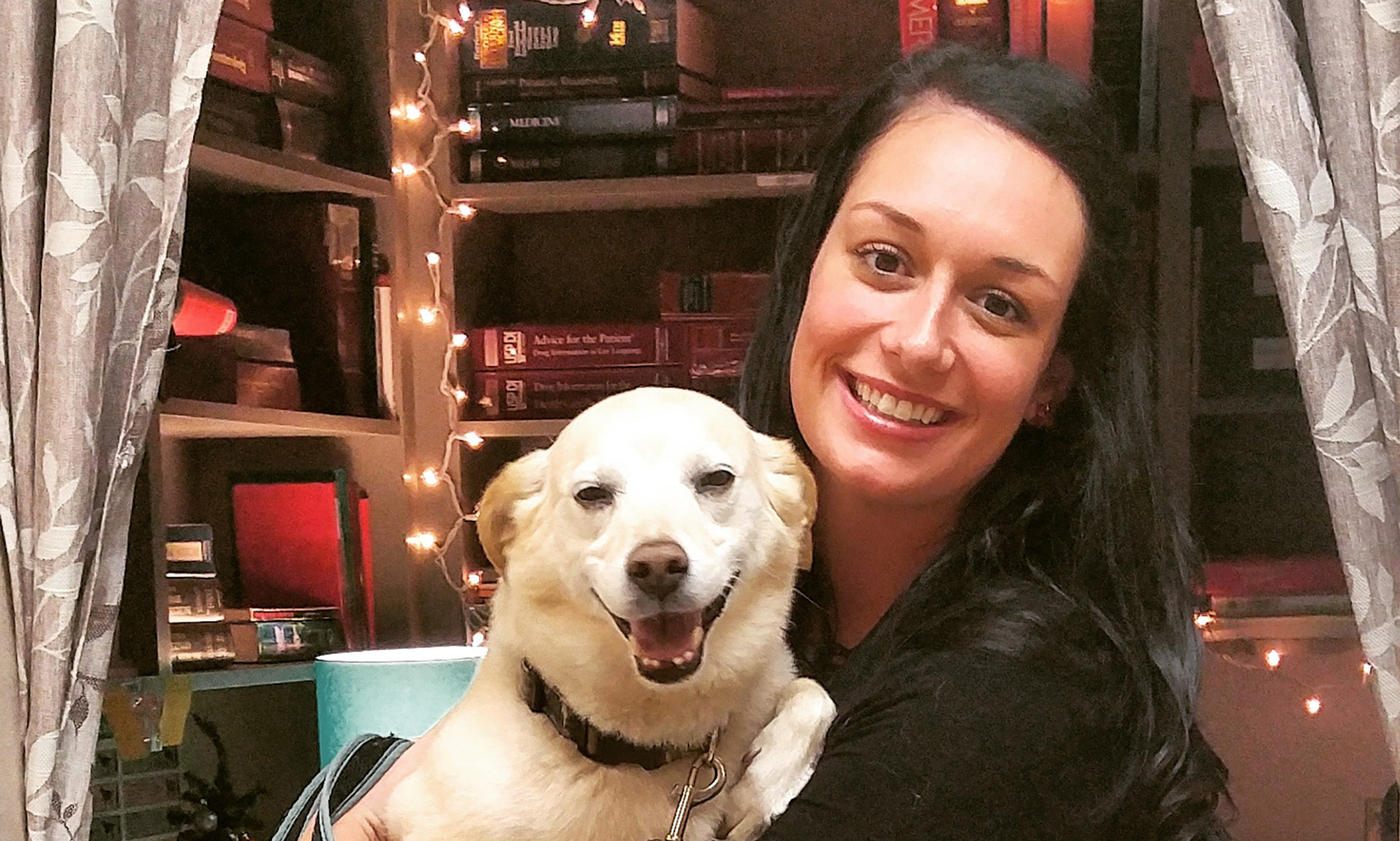
School of Pharmacy’s Emma Stafford is the lead author of the article in the Journal of the American Pharmacists Association
A drug routinely used in treating type-2 diabetes could also make those patients more susceptible to complications from COVID-19 says a report written by a UMKC School of Pharmacy researcher.
The article published in late May in the Journal of the American Pharmacists Association says the drug, captopril, was found to produce a statistically significant higher rate of pulmonary adverse drug effects compared to other drugs in its class.
Emma Stafford, Pharm.D., is the lead author of the article. Stafford worked with a group of data scientists from a collaborative known as 1Data to comb through a large source of information from national and international databases. 1Data is a partnership between UMKC and Kansas State University that has developed a platform for sharing human and animal health research data.
Stafford and her 1Data colleagues evaluated all adverse drug effects reported to the Food and Drug Administration for diabetic patients taking common front-line drugs known as ACE (angiotensin converting enzyme) inhibitors and ARBs (angiotensin-II receptor blockers).
“They were able to actually delineate diabetic patients that were taking these medications,” Stafford said. “Because pulmonary side effects are so common and so prevalent in COVID-19 patients, we were trying to ascertain if captopril, which is the oldest ACE inhibitor, might worsen someone with pulmonary issues from this disease.”
Stafford concluded in the article that going forward, pharmacists and clinicians must consider the specific adverse event profile of specific medications, particularly captopril, and how that might affect infections and other acute disease states that could alter pulmonary function, such as COVID-19.
ACE inhibitors are known to upregulate the ACE2 enzyme that is responsible for cellular entry of SARS-CoV-2. Stafford likened the effects of using captopril to a door that opens a path for the coronavirus to enter the body.
“By taking this medication, instead of having one door, you now have 20,” she said. “So, you can see that can put patients at risk.”
At the same time, Stafford said captopril also helps create a molecule that can help protect people infected with the COVID-19 virus.
“It's a really fine line and I think a lot of research is trying to toe that line and figure out which way is more predominant; is it protective or is it putting patients at risk,” Stafford said. “That was what we wanted to look at in the data. But I do think it’s early to tell exactly what effect it will have.”
Stafford is already working with a physician-researcher at the UMKC School of Medicine to look specifically at patients who have tested positive for the coronavirus and whether those on ACE inhibitors and ARBs fare worse than others not using the medications.
“These drugs are being taken for a reason,” Stafford said. “If we can help delineate these specific drugs that are a problem, it can eliminate much the confusion amongst clinicians and patients.”
Jun 16, 2020
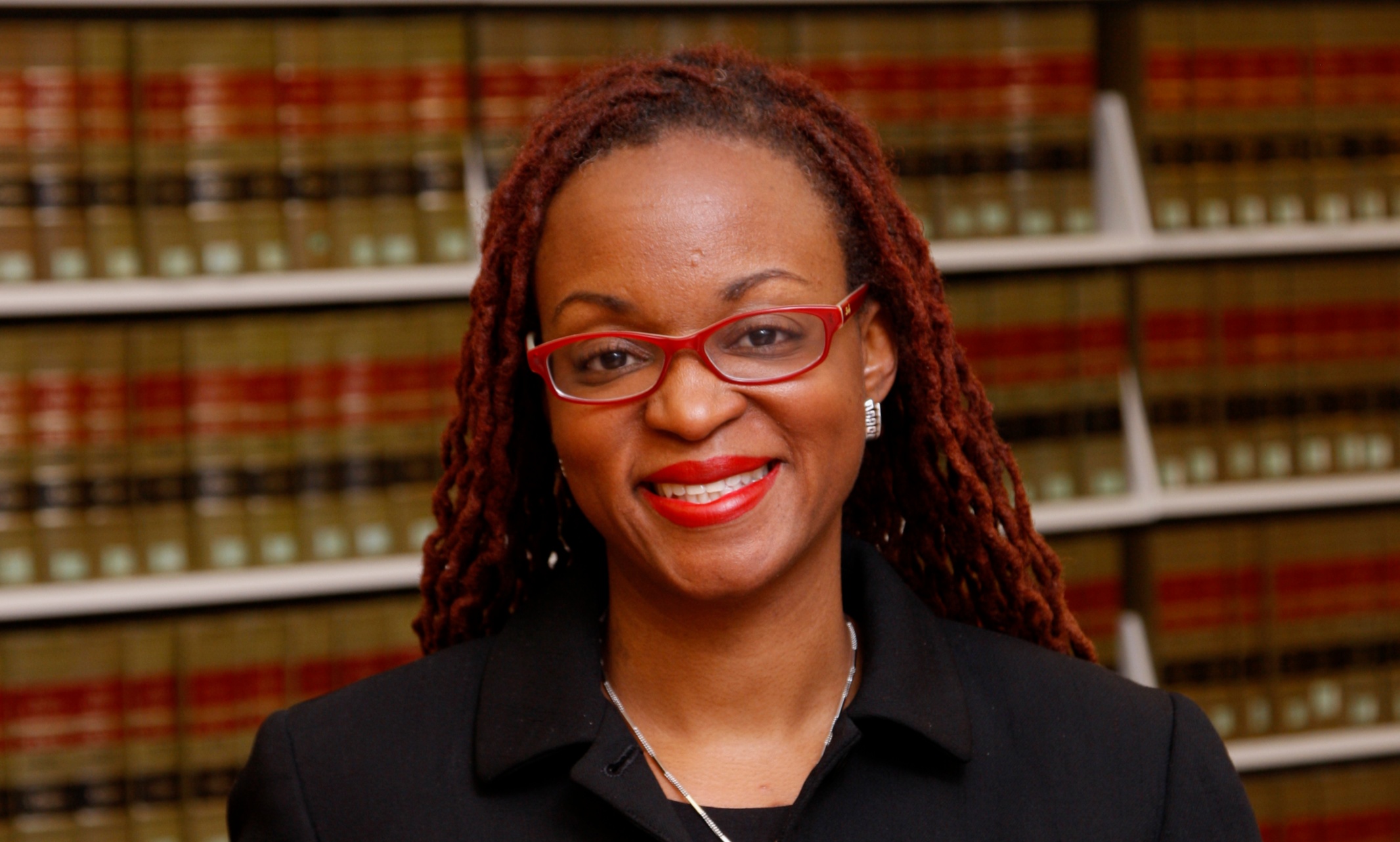
Five Questions With Jamila Jefferson-Jones
Cell phone videos in recent years have captured multiple incidents in which white people have threatened African Americans with calls to police in situations in which no laws are being broken. The case of a white woman walking her dog in New York’s Central Park threatening a black man in this manner was the latest example of a phenomenon that has been called “Living While Black.”
Jamila Jefferson-Jones, associate professor of law at the University of Missouri-Kansas City, recently co-authored an article, "#LivingWhileBlack: Blackness as Nuisance," published by American University Law Review. She was subsequently interviewed for a New York Times article on the phenomenon.
Jefferson-Jones recently discussed the phenomenon with UMKC Today.
Can you explain the “Living While Black” phenomenon in layman’s terms?
The hashtag #LivingWhileBlack first appeared as a social media hashtag to mobilize attention to incidents where white people called the police on Black people for engaging in non-criminal/everyday activities such as shopping, using the sidewalk, swimming in community pools, studying in university common rooms or sitting in a Starbucks. While the term “Living While Black” had been previously used to describe the fraught conditions of navigating racist encounters for Black people, the hashtag brought this term into the nation’s common lexicon. It is a play on an older term, “Driving While Black,” which euphemistically describes the violence of racial profiling of Black drivers by law enforcement.
What does it mean for a public space to be “racialized”?
A public space is “racialized” when it is ascribed a racial identity or character that includes some and excludes others on the basis of race. Those spaces can be neighborhoods, public parks, avenues/boulevards, or sidewalks, among other spaces. Spaces are racialized by the people who use and lay claim to them, irrespective of whether those spaces are legally designated as public or private. The idea is that a claim is wrongfully staked to shared space in the name of racial exclusion based in notions of white supremacy.
What role has cellphone technology played in making Living While Black a “genre”? Is the net impact on black Americans positive or negative — i.e., easier for racists to call police quickly, but also a capacity for victims/bystanders to collect video evidence?
Cellphone technology has put high-quality video production and distribution in the hands of the masses. Everyone is able to use this ostensibly objective medium to validate their witness to abuses — whether to the circumstances prompting false 911 calls or to police violence. The ubiquity of cellphones does make it easier for racists to call the police quickly, but I think this is outweighed by the benefits that victims and bystanders are able to reap. Cellphone video corroborates what had previously been dismissed as unreliable.
Explain how the vocabulary and word usage of 911 callers is key to revealing their true racial intent — i.e., “you don’t belong here.”
In our law review article, we examined video recordings and transcripts of 911 calls from 2018 and 2019. Our research highlighted language that either explicitly called for exclusion of the victim based on his or her race or that employed racially coded language (“dog whistles”) to call for the removal or expulsion of Black people from shared space. In one instance, where a white graduate student called Yale’s campus police on a Black graduate student who was napping in their dormitory’s common room, both the white graduate student and the police relied on the language of “belonging” to question the Black student’s presence in the building. The implication was that someone like her could not possibly belong in such a Yale dorm.
Last month, when Amy Cooper called 911 on a Black birdwatcher in New York City’s Central Park, she deployed racist ideas about Black men to communicate to the dispatcher that he was a threat. In fact, before she called 911, she told Mr. Cooper that she was going to leverage racist ideas to summon police. Her intention was to signal to the dispatcher that Christian Cooper’s race alone made him a threat worthy of swift police response.
What are the potential legislative or procedural remedies that could reduce the incidence of #LivingWhileBlack events?
Some cities and states have enacted laws that punish perpetrators of #LivingWhileBlack abuses. Last year, the city of Grand Rapids, Michigan passed a human rights ordinance that prohibits crime reporting based, among other things, on an individual’s actual or perceived color or race. Such biased crime reporting may result in prosecution for a municipal civil infraction and is punishable by a modest fine in addition to costs, damages, expenses and sanctions. Also last year, Oregon enacted legislation that allows targets of #LivingWhileBlack calls to sue those who initiate such calls for civil damages up to $250. In the wake of the recent incident in Central Park, a bill that was introduced two years ago in the New York State Assembly has gained new life. It is already illegal in New York to make a false 911 call; if this new bill is passed, it will make it a hate crime to call 911 and make a false accusation of criminal activity based on race, gender or religion.
In addition to statutory remedies, there have been calls to better train 911 dispatchers so that they ask questions aimed at rooting out bias rather than unquestioningly sending officers to the scene. Finally, police must also be better-trained to respond to instances that may be #LivingWhileBlack occurrences — and to better protect the victims of such false reporting.
Jun 16, 2020
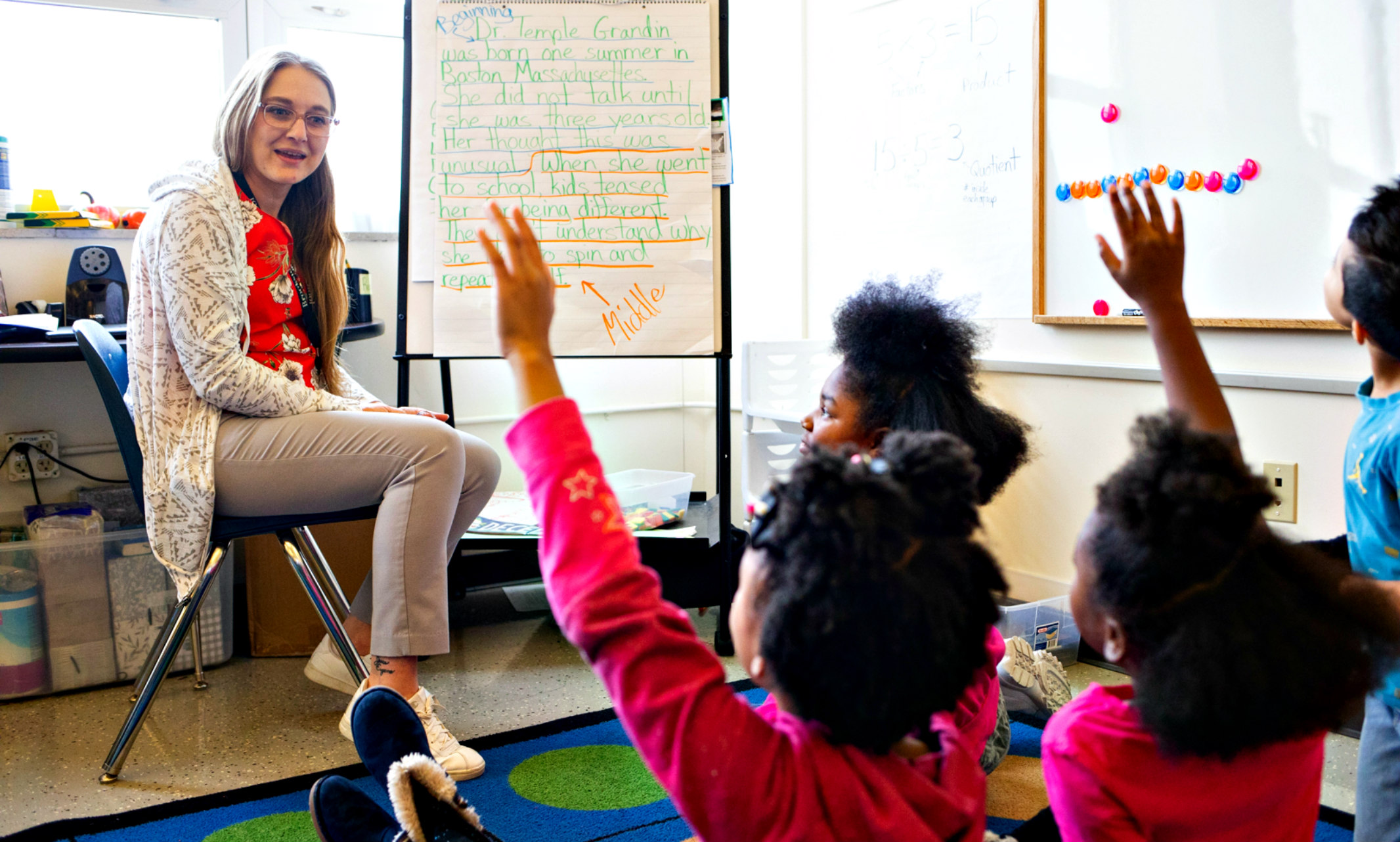
UMKC School of Education’s Institute for Urban Education offers guidance on creating culturally inclusive classroom environments
In the current racial climate and unrest facing America today, and as schools continue to explore how classrooms will be structured post-COVID-19, Jennifer Waddell, director of the UMKC School of Education’s Institute for Urban Education, said the preparation of teachers has become increasingly critical in uplifting our society and promoting educational equity and justice.
“Racism and oppression are both learned and practiced throughout societal institutions, including schools and, in particular, through the socialization of children and youth,” Waddell said in a statement following the recent deaths of black men and women due to racism and systemic injustice. “Teachers help children and youth interpret, make sense of, and view the world around them. Therefore, it is critical that they understand the power they yield, as well as, their influence and the importance of implementing a culturally responsive and anti-racist curriculum. It is also our duty as educators to identify and eradicate racist policies and practices within educational systems and communities.
Institute for Urban Education faculty and staff shared their thoughts on how teachers can do their part to develop inclusive classroom curricula and ensure their classrooms are a safe space for black students.
"It's important to understand yourself first," said associate director Bradley Poos. "It's more than just reading books; you have to be willing to do self-examination and allow yourself to be vulnerable and recognize your unconscious biases."
Poos said that while the institute trains teachers to foster inclusive classroom environments, they are also committed to increasing the number of students of color who want to be teachers.
“Teachers are trained to be the expert voice in the classroom and focus on the curriculum on the shelf, but there’s a need to engage the curriculum of self.” - Jennifer Fergerson, program coordinator, Institute for Urban Education
“Studies show that students who have a teacher that looks like them at an early age are 17% more likely to go to college,” Poos said. “The percentage of likelihood increases to 35% if they have two. That’s why we ensure we're able to recruit and retain teachers of color.”
At the Institute for Urban Education, faculty and staff view education as a form of social justice. There is only 5 percent of teachers of color statewide in Kansas and Missouri and, according to Poos, that’s not unintentional.
“Black teachers were pushed out after the Brown vs. Board of Education decision and we haven’t recovered,” he said. “When we integrated schools, we accounted for students, but we didn’t account for teachers. We’re making a push to help undo that.”
“Studies show that students who have a teacher that looks like them at an early age are 17% more likely to go to college.” - Bradley Poos, associate director, Institute for Urban Education
Program coordinator Jennifer Fergerson said that one reason oppression continues to be so prevalent is that we haven’t learned how to listen to one another. Learning to listen and engage in discourse starts in school.
“Teachers are trained to be the expert voice in the classroom and focus on the curriculum on the shelf, but there’s a need to engage the curriculum of self,” Fergerson said.
She said teachers have to create student voice in the classroom, especially in areas like social studies and literature. It’s up to teachers to ensure they use supplemental material to ensure multiple voices are presented and give students the opportunity to analyze from different perspectives.
“Students are the experts on their identities and their lives,” Ferguson said. “They should be a part of setting norms in the classroom. They want to learn, and they want respect.”
Institute for Urban Education staff suggests:
Incorporating room meetings to give students an opportunity to share and be a part of creating classroom norms
Implementing an 80/20 rule – 80% student and 20% teacher – to ensure teachers are doing more listening and moderating discussion among students, allowing them to learn from one another and give voice to necessary conversations
One-on-one conferences with students to check in on their success and build relationships,
Studying and really getting to know students’ names
Building authentic relationships with students’ families, letting them see teachers as human
Waddell said this work isn’t just for teachers in schools with predominantly black student bodies; predominantly white schools need to do this work as well – in some ways, more importantly.
“Teachers help children and youth interpret, make sense of, and view the world around them. Therefore, it is critical that they understand the power they yield, as well as, their influence and the importance of implementing a culturally responsive and anti-racist curriculum." - Jennifer Waddell, director, Institute for Urban Education
The Institute for Urban Education plans to continue doing its part by fostering important conversations with its future teachers, its partners and the community. This fall, the institute is launching its Grow-Your-Own program, a teacher pipeline program for future Institute for Urban Education students and teachers in local K-12 schools. Its goal is to recruit more teachers of color, especially males, who view education as a social-justice profession and want to remain in Kansas City to pursue their careers.
Beginning July 8, the institute will host a free weekly webinar series, Voices in Education, to share resources with local teachers and continue the conversation surrounding the need for diversity, equity and inclusion in education.
Classes will take place at 1 p.m. each Wednesday and cover topics like anti-racist classroom practices, promoting student voices, tech tools for the classroom and remote learning and more. Follow the UMKC School of Education on social media for upcoming registration details.
The mission of UMKC School of Education’s Institute for Urban Education is to prepare and support exemplary teachers for richly diverse schools in Kansas City.
Jun 15, 2020
Nancy Levit, an employment law scholar and associate dean at the University of Missouri-Kansas City School of Law, was interviewed by Forbes about ...
The ruling is “historic, long overdue, and offers some hope that many of our fellow citizens can now feel more secure at work,” noted Nancy Levit. Read the full Forbes article.
Jun 15, 2020
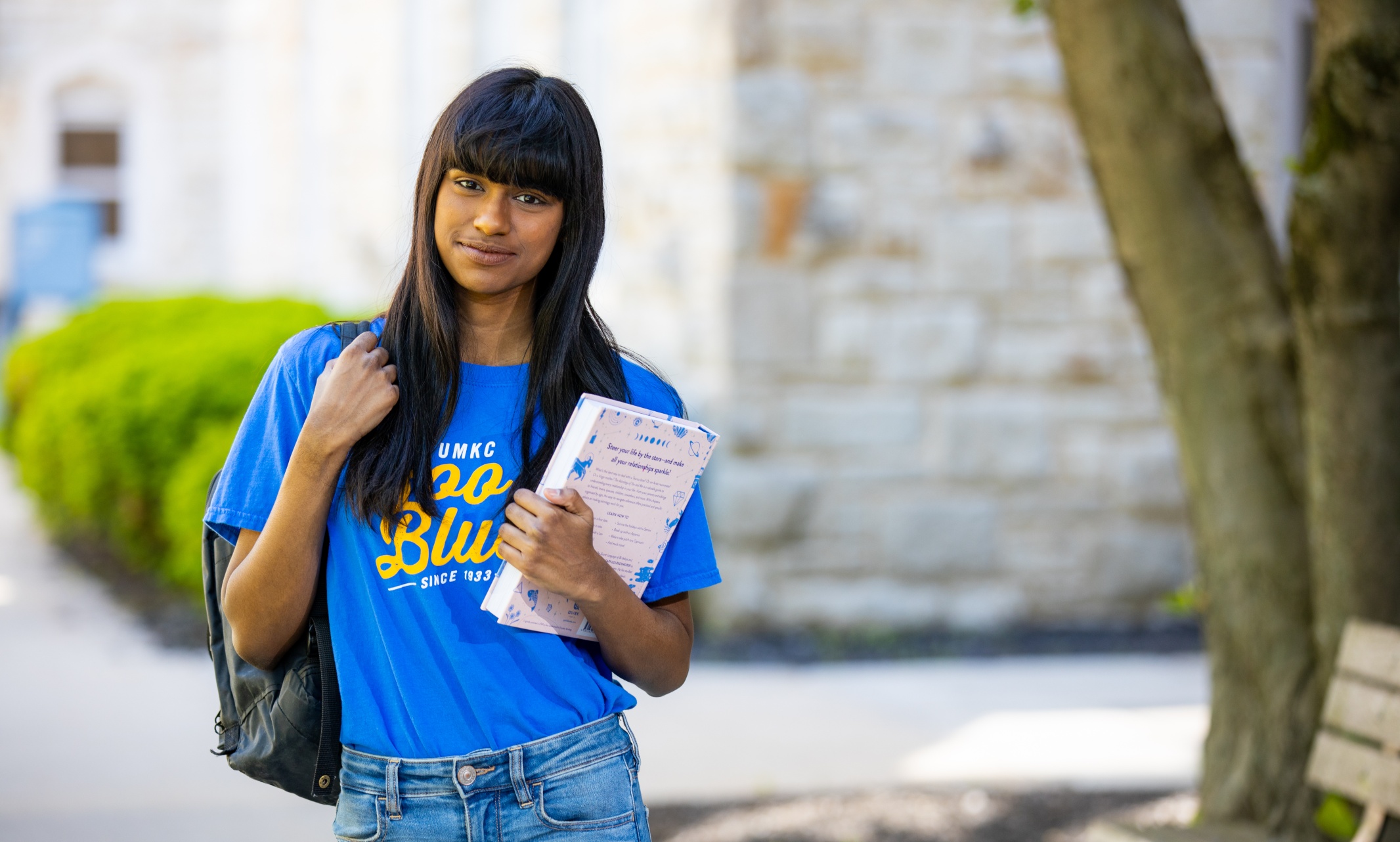
Even in uncertain times, it’s a decision I am confident about
COVID-19 is continuing to change the way our world is functioning. However, one thing that has remained a constant throughout this global pandemic is my determination to complete my degree as soon as possible.
It is important to acknowledge that although COVID-19 momentarily caused the world to be at standstill, our goals and dreams will not wait for anyone. Here are some reasons why I am eager to go back to school in the fall.
1. There are still things I need to learn for my career.
Growing up, I always loved learning about new things. Academics has played a significant role in my life and has taught me so much about the world we live in. I cannot imagine taking a break from my college experience because I know learning plays an important role in my everyday life and will in my future career as well. I already have my classes picked out for the fall semester and am looking forward to continue to learn more about everything, from American literature to Physics.
2. I still want to make a difference on campus.
A huge part of my college experience has been defined by being involved in various organizations. I would definitely like to continue to be a part of these organizations and contribute as much as I can. I am very excited and despite the uncertainty, I cannot wait to contribute my efforts and ideas towards the organizations I am currently involved in, which include Her Campus at UMKC and the UMKC Student Government Association (UMKC SGA). Also, I am currently a writing consultant at the UMKC Writing Studio. Working on campus has been a significant part of my college experience. The UMKC Writing Studio is one of the places where I can truly express and develop my passion for writing while helping my peers. I definitely want to go back to school in the fall so that I am able to continue working there – whether that is in person or online.
3. UMKC continues to help me grow as a leader.
UMKC has been the place that has allowed me to grow not just academically, but holistically as well. I have become a more well-rounded person with various leadership qualities under my belt due to the experiences UMKC has offered me. I cannot imagine taking a break from my undergraduate academics as this would mean that I would not have many opportunities to continue to grow as a person.
Knowing that UMKC is #RooReady has definitely alleviated my anxiety surrounding going back to campus in the fall. I’m encouraged about the steps the university is taking to ensure students are safe while getting a high-quality education.
Krithika Selvarajoo is a senior double majoring in English and Chemistry, and an orientation leader. Upon graduation in 2021, she plans to further her studies to potentially work in a health care setting.
Jun 11, 2020
Recommended reading by University Libraries and English Department to build empathy and understanding
In support of the Black community in Kansas City, nationwide, and all over the world, here are resources for recommended reading.
University Libraries Diversity, Equity and Inclusion Committee has compiled a list of resources to help those support racial justice and as well as a reading list.
Gloria Tibbs, organizational development coordinator for University Libraries, is the founder of the African American Read-In at UMKC. She was recognized by the White House in 2013 as a "Champion of Change." Her recommendations include The Venus Hottentot by Elizabeth Alexander, An expanded edition of Movement in Black by Pat Parker and Brown Girl Dreaming by Jacqueline Woodson.
Broadcasting from UMKC since 1977, the literary radio show New Letters on the Air has long been known for its diversity of voices among writers of poetry, fiction, essays, plays and more. Producer and host of New Letters, Angela Elam recommends listening to recordings in their extensive archives such as Gwendolyn Brooks, Terrance Hayes, Audre Lorde, Stanley Banks and Stephanie Powell Watts.
Imaginative storytelling has the narrative power to build greater empathy within and among readers. The English Department offers the following list of recommended creative works by African American writers:
Hadara Bar-Nadav, professor and director of Creative Writing, recommends: Gwendolyn Brooks’ Selected Poems
Virginia Blanton, Curators’ Distinguished Professor, recommends: Zora Neale Hurston’s Their Eyes were Watching God
Britta Bletscher, M.A. student and graduate teaching assistant, recommends: Alice Walker’s The Color Purple
Crystal Doss, associate teaching professor, recommends: Toni Morrison’s Beloved
Madison Clay, M.A. student, recommends: Angie Thomas’s The Hate U Give
Ande Davis, Ph.D. candidate, recommends: Kwanza Osajyefo, Tim Smith, Jamal Igle, and Khary Randolph’s BLACK
Laurie Ellinghausen, professor and interim chair, recommends: Ralph Ellison’s Invisible Man
Robert Farnsworth, emeritus faculty, recommends: Richard Wright’s Native Son
Thomas Ferrel, instructor and director of the Writing Studio, recommends: Alice Walker’s To Hell with Dying
Jane Greer, Curators’ Distinguished Teaching Professor, recommends: Nella Larsen’s Quicksand
Emily Grover, instructor, recommends: Chimamanda Ngozi Adichie’s Americanah
Christie Hodgen, professor and editor of New Letters, recommends: James Baldwin’s “Notes of a Native Son”
Sheila Honig, lecturer, recommends: James Baldwin’s “Sonny’s Blues”
Ben Jasnow, instructor, recommends: Frederick Douglass’ Narrative of the Life of Frederick Douglass, an American Slave
Sarah Beth Mundy, instructor: recommends: Chinua Achebe’s A Man of the People
Ashley Pendleton, M.A. student and graduate teaching assistant, recommends: Nic Stone’s Dear Martin
Jennifer Phegley, professor, recommends: Colson Whitehead’s The Underground Railroad
Robert Stewart, former editor of New Letters, recommends: Tim Seibles’ One Turn Around the Sun
Jun 11, 2020
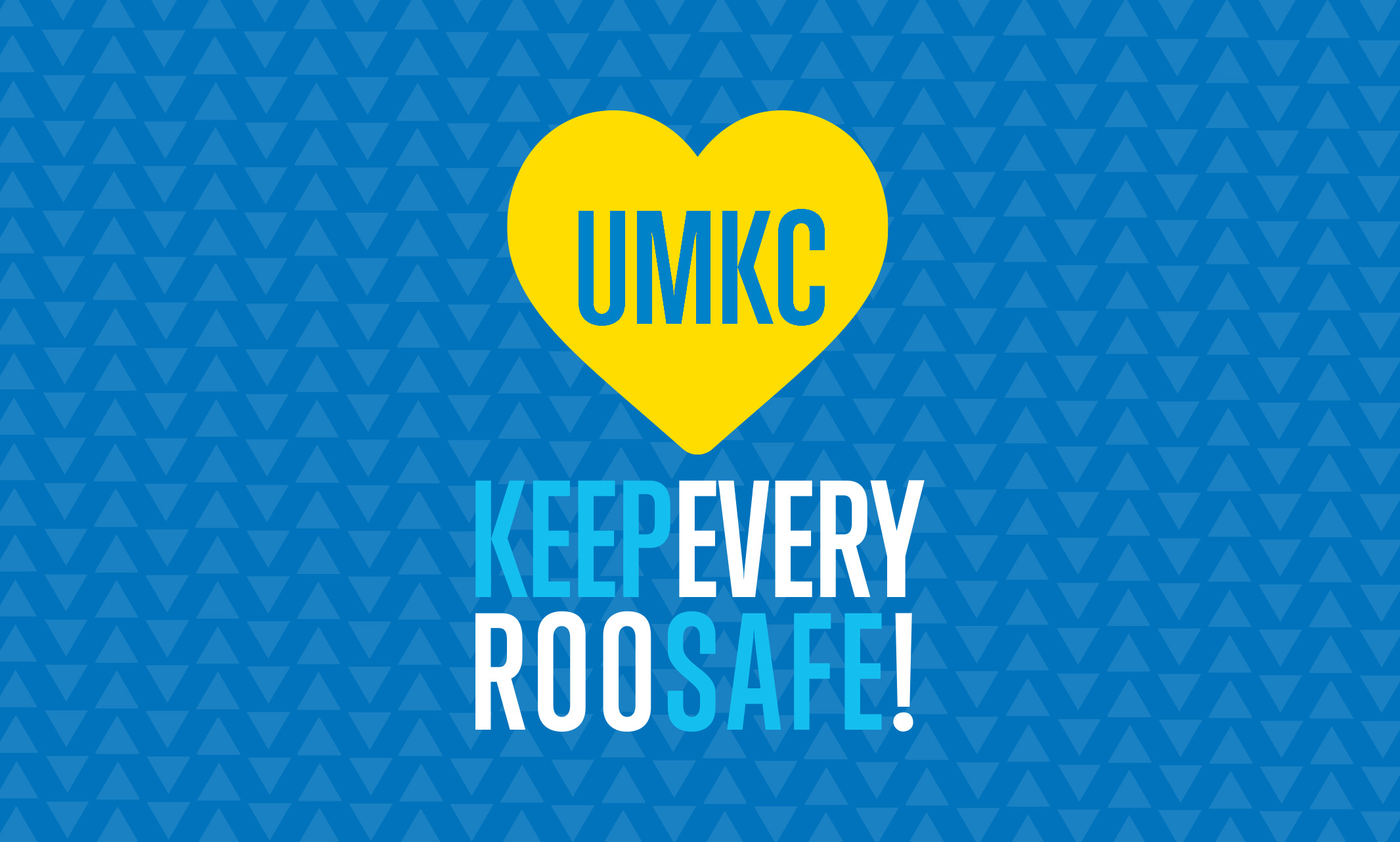
University taking precautions during pandemic
UMKC has been working hard to follow the latest recommendations and precautions to keep our students, faculty and staff safe on campus as we continue to deal with COVID-19.
We spoke to Michael Graves, director of facilities operations at UMKC, to give us the information we’ve all wanted to know as we get ready to return to campus.
What are we doing to keep university facilities clean?
While buildings have been closed, Campus Facilities Management has remained on site performing enhanced cleaning and disinfecting of facilities at both Volker and Health Sciences campuses. They are using procedures recommended by the CDC and products approved by the EPA as effective against COVID-19. We’re continuing to follow those protocols as a part of daily cleaning and disinfecting services.
High-touch points like handrails, door handles and light switches are receiving increased cleaning. Most of that daily cleaning occurs overnight and during the early morning hours so that buildings are ready to be used the next day.
Is hand sanitizer being used on campus? Where are the dispensers?
Yes, hand sanitizer dispensers are stationed at every building entrance as well as other high-traffic areas. Our team will refill these daily. If you see a dispensing station that has been damaged or needs service, please call Campus Facilities Management at 816-235-1354.
What will be different about buildings when we return to campus?
Elevator capacities are being reduced to two-person occupancy to accommodate social distancing. New signage encourages occupants to face away from each other while in the elevator.
Water fountains are being taken off-line to prevent use. Bottle fillers will remain operational.
Acrylic “Plexiglas” type screens are being installed at reception desks, service counters and other spaces where close interaction for prolonged periods is common and social distancing is not practical. These are generally custom-made and may be requested by individual units as needed.
Breakrooms, lunchrooms, open shared spaces and gathering areas will be closed or significantly limited in use to avoid social gatherings. They may still be used for food and drink preparation and consumption (one at a time, or multiple people as long as 6-foot social distancing can be maintained). Users should disinfect any shared appliances after use including copiers, fax machines, microwaves and coffeemakers. There will be cleaning supplies nearby.
Tell us about the new signs on campus.
Signage is being placed around campus identifying sanitizer dispensers, promoting hand hygiene and social distancing practices, revising occupancy limits and more. It’s part of the university’s “Keep Every Roo Safe” campaign.
Do the buildings’ heating and air conditioning systems provide fresh air to the spaces?
Yes, UMKC buildings are designed to meet building code ventilation requirements that are based on the American Society of Heating, Refrigerating and Air-Conditioning Engineers (ASHRAE) standards. Those standards require a set number of air changes in every space per hour, based on the size and type of area. Those air changes include a certain percentage of outside air. All of those amounts are calculated to provide good air quality for the maximum occupancy allowed in the space. Since spaces are rarely filled to maximum occupancy, the buildings are almost always over-ventilated during normal operations.
What will Campus Facilities Management do if there’s a suspected case of COVID-19 on campus?
After any suspected case of COVID-19 on campus is communicated to campus leadership, Campus Facilities Management immediately will help vacate spaces that are potentially affected and close them so that others do not enter. Following CDC guidelines, the area will remain closed for at least 24 hours, before being thoroughly disinfected using an EPA- and CDC-approved process.
We want to make sure we maintain a safe environment for students to learn, and for our faculty and staff to teach and work.
Jun 11, 2020
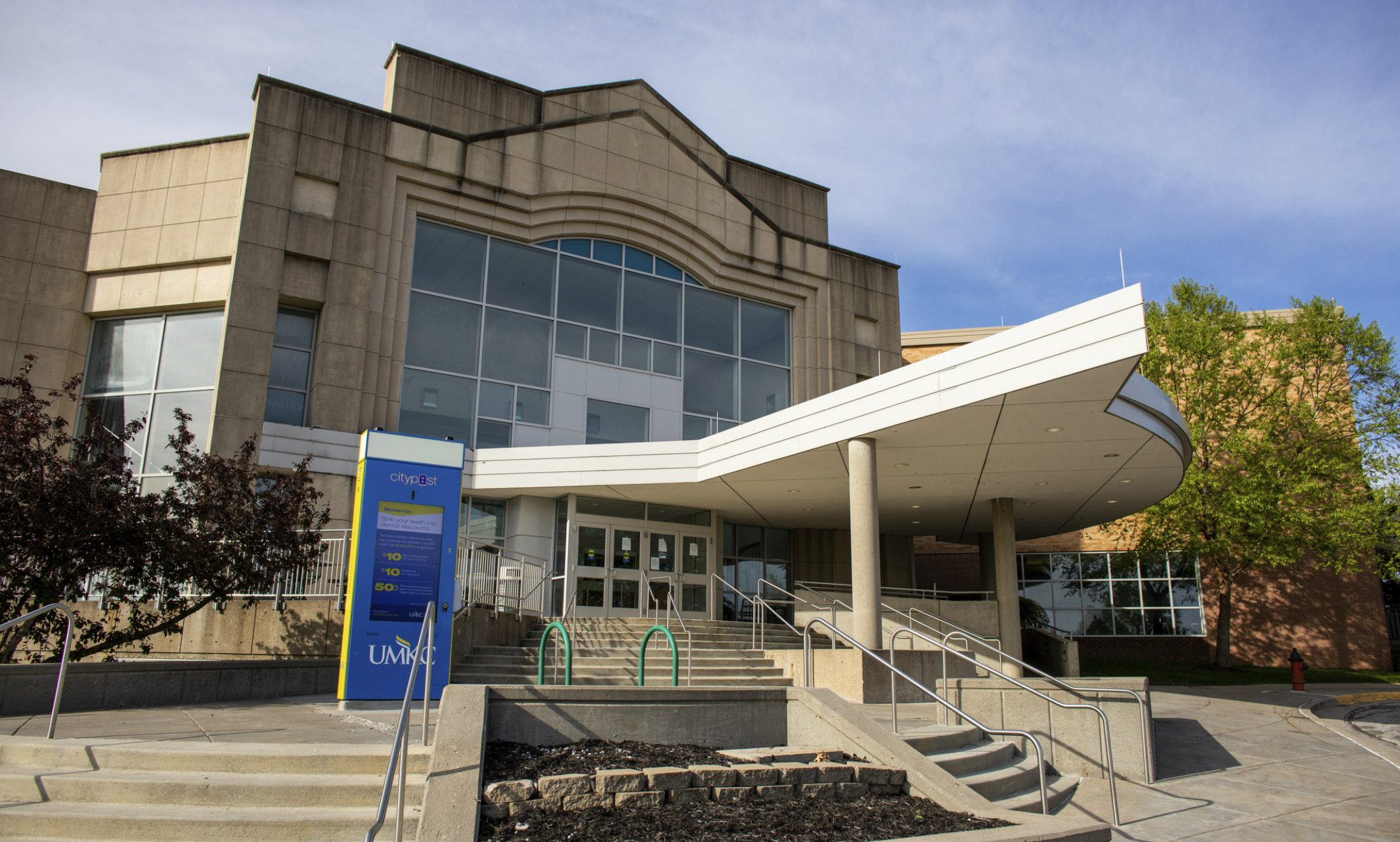
Faculty, staff tackle ‘big lift’ to meet demand
How’s this for a Rubik’s cube-level puzzle challenge? UMKC typically schedules more than 5,800 courses a week. Now we have to limit all of our classrooms to only 25% of capacity due to COVID-19. There is some extra meeting space available, but not nearly enough to consequentially meet what is essentially a four-fold increase in demand for classroom space.
What do we do?
Ask UMKC Registrar Amy Cole. She and her team are doing it.
To maintain recommended social distancing in response to the COVID-19 pandemic, the university is mandating that classroom population be limited to 25% of capacity for the fall semester. That key element of the #RooReady challenge landed in the lap of the Registrar’s office.
To make it work, Cole and her team are converting event spaces including Pierson Auditorium and the fourth floor of the Student Union into classroom space, while exploring “every nook and cranny” of almost every building on both campuses to make sure students and faculty can socially distance while having a great in-classroom experience. The team is working with each of the schools to expand online and hybrid class offerings, and offer more evening and early-morning sections of popular classes.
“It’s a big lift, and we’re still at it,” Cole said. “We’re still finding spaces that can be converted to classrooms, figuring out a safe capacity for them and working them into the schedule. The goal is to give as many students as possible as much of what they want as possible. It’s time consuming, but we have a great team of dedicated people committed to getting it done.”
Other members of the UMKC community are hard at work as well in order to meet this unique challenge. Faculty are undergoing summer training to create format flexible courses. This means that while they are planning to teach in-person, they will have a Plan B to take classes online if the COVID environment makes that necessary. Those plans will be communicated clearly to students in the syllabus at the beginning of the semester to minimize surprises or disruptions during the semester.
Instructors will have new flexible attendance policy guidelines to meet the unique demands of attending class during a pandemic, including guidelines for those with underlying health conditions or other situations. Those guidelines will be clearly laid out in the syllabus. Students requesting COVID-related academic accommodations should contact Scott Laurent at (816) 235-5696 or by email at laurentr@umkc.edu.
UMKC also is making increasing use of “hybrid” courses for the fall, which include a combination of online and in-classroom sessions. For example, the course readings and online lectures are completed outside of class and students meet in person for smaller discussion groups or lab sections.
The university is expanding online offerings of both “synchronous” courses, which are conducted in real time with ongoing interaction among students and instructors; and “asynchronous” courses, which allow students to access the material at times of their own choosing. Even for fully online courses, faculty are preparing them so that there are opportunities for small group, virtual break-out sessions allowing students to have safe, meaningful engagement with other students and the faculty.
“We are looking at scheduling some sections as early as 7 a.m., or on weekends,” Cole added. “Some students may prefer an online course meeting at a more convenient hour.”
Classes involving internships, service learning, and clinical rotations/practica will have to be set up, and communicated, on an individual basis.
“We’re trying to provide as much flexibility as we can while sticking to that 25% capacity limit,” Cole said. “UMKC wants to provide all of our students with an engaging and meaningful college experience despite the challenges presented by the pandemic.”
Jun 11, 2020
Ericka Mattingly played during the 2019-20 women’s basketball season and was featured in The Kansas City Star
On June 12, she received the Spire Sportswoman of the Year Award from the Kansas City Sports Commission. Read more about her in the article from the Kansas City Star.
Jun 10, 2020
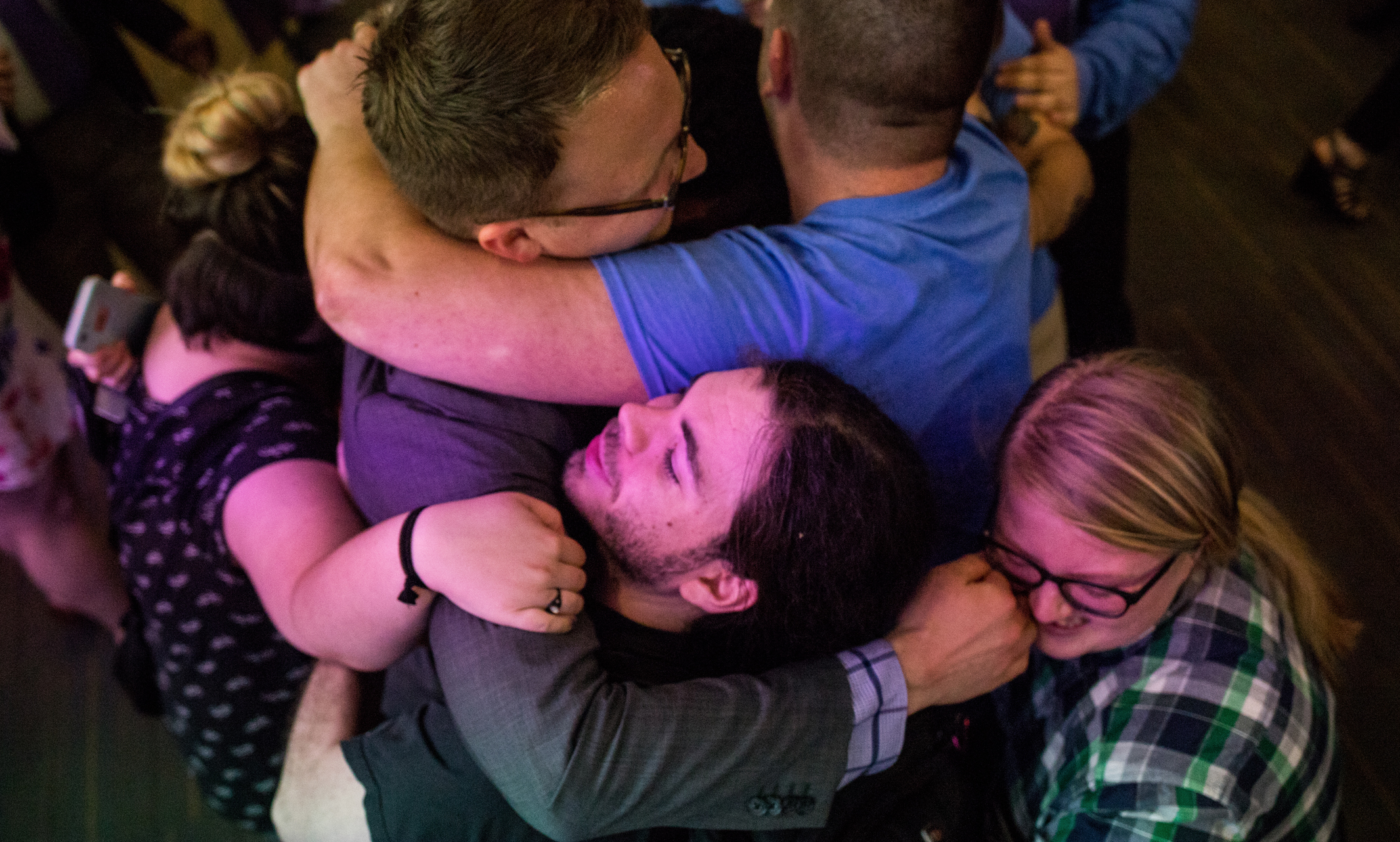
Annual program honors accomplishments by students, faculty, alumni and more
The annual UMKC Pride Awards recognize outstanding individuals in the community who have contributed to the betterment of the LGBTQIA+ community through education, support, programming or activism. These awards honor those who have contributed in the areas of service and outreach, establishing a safer and more welcoming environment at UMKC.
“This year, our office was blown away by the nominations and the quality of awards candidates,” said Kari Jo Freudigmann, assistant director, LGBTQIA Programs and Services. “There are many change-makers on campus and in our local community, and we want to be sure they know that their work and efforts do not go unnoticed.”
The full list of 2020 awards includes:
Note: The text under the names of each award recipient are excerpts from the nomination packets.
Outstanding Faculty/Staff: Tamica L. Lige
Recognizes lesbian, gay, bisexual, transgender, queer, intersex, asexual, or ally faculty or staff who contribute to a positive campus climate for LGBTQIA individuals.
“Plenty can talk, plan or imagine: Tamica Lige gets to work. Under Ms. Lige’s leadership, an organization on UMKC’s Hospital Hill with an established history expanded its mission to include the needs of LGBTQIA+ people.”
“Tamica Lige scheduled sessions with healthcare providers at institutions with which UMKC has partnerships in order for us to learn more about the needs of transgender patients and their struggles navigating healthcare systems.”
Jim Wanser Award: Mark T Sawkin
Named for the faculty member, advisor and guiding force to the UMKC LGBT Initiative and its development into the LGBT Office, this award recognizes an individual who has volunteered hours of service to the UMKC LGBTQIA community or the greater Kansas City LGBTQIA community.
“Dr. Sawkin is heavily involved in the UMKC STAHR program that focuses on ways in which we can increase program retention for students that come from underserved backgrounds. One way in which he has done this is by eliminating barriers, and helping all his students, including myself, feel accepted.”
Rising Star Award: Jager “Jay” Wirth
Recognizes one area high school student whose leadership and service have resulted in a tangible gain for LGBTQIA students (such as Gay/Straight Alliance), or whose energies have created a more friendly, inclusive environment at their high school.
“Jager helped to found the GSA at our high school two years ago, as before there wasn’t really a safe space for students in the LGBTQIA community to go and be supported by peers and faculty as well. Jager saw a need, and he made it happen.”
Outstanding Alumni Award: Taryn Hodison
Recognizes one UMKC Alum who works toward fostering an inclusive community, at UMKC or in the community in which they live and work.
“She has a gift of being able to provide a space in which those identifying as LGBTQIA+ feel safe, seen and heard, something many have never felt.”
“Taryn has a special interest in transgender youth, especially in providing them with education, fellowship, connection and acceptance. She has hopes of developing a program that will benefit Kansas City youth that can also be taught and implemented nationally.”
Graduate/Professional Student of the Year Award: Luke R. Allen
Recognizes one student for outstanding leadership, dedication and service within the university, or in the community, that has resulted in new or revitalized resources, services, or programs for the LGBTQIA community.
“Luke is especially interested in topics related to sexual and gender diversity, including LGBTQ youth, counseling effectiveness, and culturally relevant counseling approaches with these populations. Luke developed a study that explored the extra-familial sources of support for transgender and gender nonconforming youth.”
Undergraduate Student of the Year Award: Kristen Garcia
Recognizes one student for outstanding leadership, dedication, and service within the University, or in the community, that has resulted in new or revitalized resources, services, or programs for the LGBTQIA community.
“I met Kristen for the first time at the 2019 Masqueerade event after she personally reached out by email to invite me. As a queer individual who never got the chance to go to homecoming and Prom, that night truly meant the world to me. That night happened because of the endless work Kristen put into it.”
Collaborative Excellence Award: Central United Methodist Church – Sally Haynes and Maggie Holley
Recognizes departments whose collaborative efforts have resulted in new or improved resources and services for LGBTQIA students, faculty, staff or community members.
“Rev. Dr. Sally Haynes from Central Methodist Church works endlessly for the students at UMKC. She has committed to ensuring her church to be inclusive and affirming of all gender and sexual identities. She put up flags and posters to tell the community that the church is on the LGBT+ side and that the community is welcome.”
“With the help of Maggie Holley reaching out to the LGBTQIA Programs & Services office, she organized a UMC Community Dinner where students from UMKC were welcomed in the church to discuss LGBT+ concerns, goals and get to know students.”
Jun 09, 2020
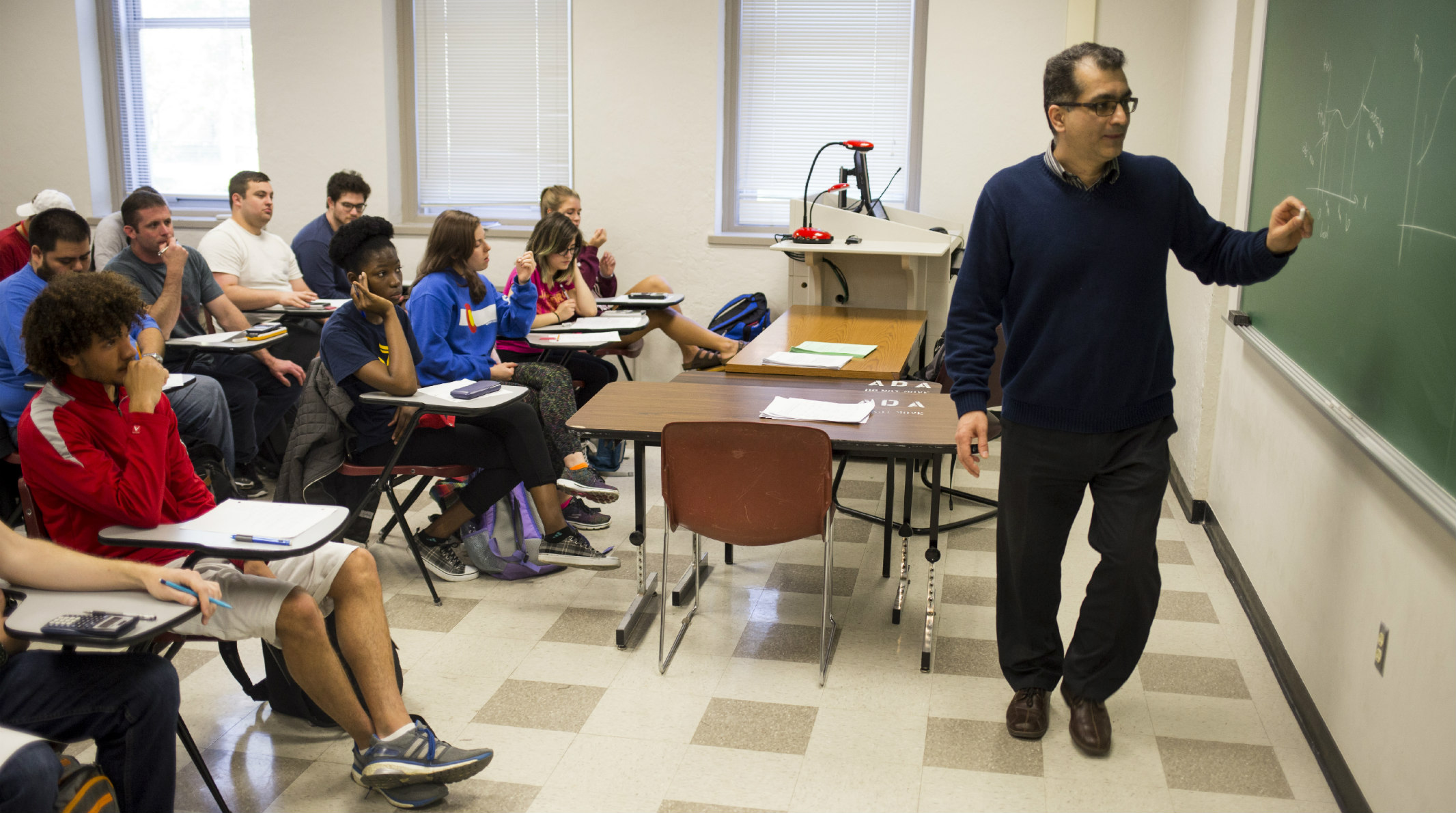
Math and statistics students began studying the potential spread in January
Before many people were aware of the COVID-19 virus and its potential for broad infection, UMKC students were building predictive models of its possible spread.
Majid Bani-Yaghoub, Ph.D. (known as Dr. Bani), associate professor and chair of the Department of Mathematics and Statistics, focuses on mathematical modeling in several areas of study including health and biomedicine. He had been following the scientific reports of the new virus in China and incorporated it into his Graduate Differential Equations class.
“I was following the news in January, and I knew modeling and analysis of the virus would be a good fit with this course,” he says. “Our work is continuing. We have three different groups using epidemiology, math and statistical models and numerical simulations to see how the virus is affected by policy.”
In addition to following the progress of COVID-19, they are using optimal control theory, to predict the best way to minimize spread.
“Analyzing which combination of control measures gives us the best result and provides a good understanding of how to stop the spread of the virus,” Bani says.
Hope Mertz, MS ‘20, Science and Mathematics, studied the spread of COVID-19 for her research project. She was not that familiar with the virus when she enrolled.
“I had just started hearing about what was happening in China, so when Dr. Bani started talking about the project, my partner [Kodi Kuhlmann] and I jumped at the chance to work on something so pertinent.”
At the time, it appeared that the virus was only spreading in a small part of China. Bani shared the website for research articles at John Hopkins University and Mertz began to think that virus was spreading further and faster than reported.
“We modeled the spread from Wuhan City to New York City via their main travel hubs,” Mertz says. “We could see that the reported number of cases was a huge understatement. I could not force my model to give me numbers as small as what was being reported.”
Besides the student projects, research on COVID-19 has yielded successful collaborations with other faculty members. Using existing resources through the UMKC Institute for Data Education, Analytics and Science, Bani has recently started research on drug repurposing with Bi-Botti Celestin Youan at the School of Pharmacy and Liana Sega, also in the Mathematics and Statistics Department in the College of Arts and Sciences.
“There are millions of untested drugs,” he says. “We can use predictive modeling, machine learning techniques and some abstract areas of mathematics such as persistent homology to explore how we could use an existing drug as a solution for the problem.”
While he is certain of the quality of his team’s work, Bani cannot predict the likelihood of another surge.
"We could see that the reported number of cases was a huge understatement. I could not force my model to give me numbers as small as what was being reported.”- Hope Mertz
“Math models are as accurate as the data,” he says. “From what we see so far, we hope that there’s a down trend, but we are not 100% sure about the data.”
Bani says we will know more once more businesses are open and more people are out.
“The spread could be really rapid, and we should follow the CDC guidelines to prevent the second wave,” he says. “We are relying on each individual. This is proven epidemiology – each person can make a difference.”
He notes that the basic reproduction number is an essential threshold value. If the average number of newly infected people caused by an infected individual is less than one, then the virus will die out.
“Social distancing and mask wearing are effective in preventing virus transmission,” he says. “We need to get used to these measures.”
Along with the other projects, Mertz and Kuhlmann’s modeling approach and research results were presented at the UMKC Sixth Annual Math & Stat Research Day on April 17.
Jun 08, 2020
Mitch Brian, associate teaching professor at UMKC, is Kevin Willmott’s former screenwriting partner
Brian was recently interviewed by the Kansas City Star about Willmott's latest film and going to the movie theater.
Jun 08, 2020
Hollywood Reporter ranks UMKC Theatre in Top 25
The Hollywood Reporter surveys alums, academics and industry pros for its annual list of the top acting schools. Read why the publication ranked UMKC Theatre.
Jun 08, 2020
The Kansas City Star featured Dentistry, Medicine, Nursing and Pharmacy students who showed peaceful solidarity
Approximately 150 healthcare workers and students gathered at the UMKC Health Sciences campus on June 6 to show their support for the Black Lives Matter movement and demonstrators fighting for racial equality and an end to police brutality. Read more from the Kansas City Star.
Jun 06, 2020
School of Law professor on Ricky Kidd legal team
Sean O’Brien, UMKC School of Law professor, worked to free Ricky Kidd, a man who was wrongfully convicted and sent to prison. The story was covered nationally at the time of the ruling and recently made headlines again, this time on BuzzFeed.
Jun 05, 2020
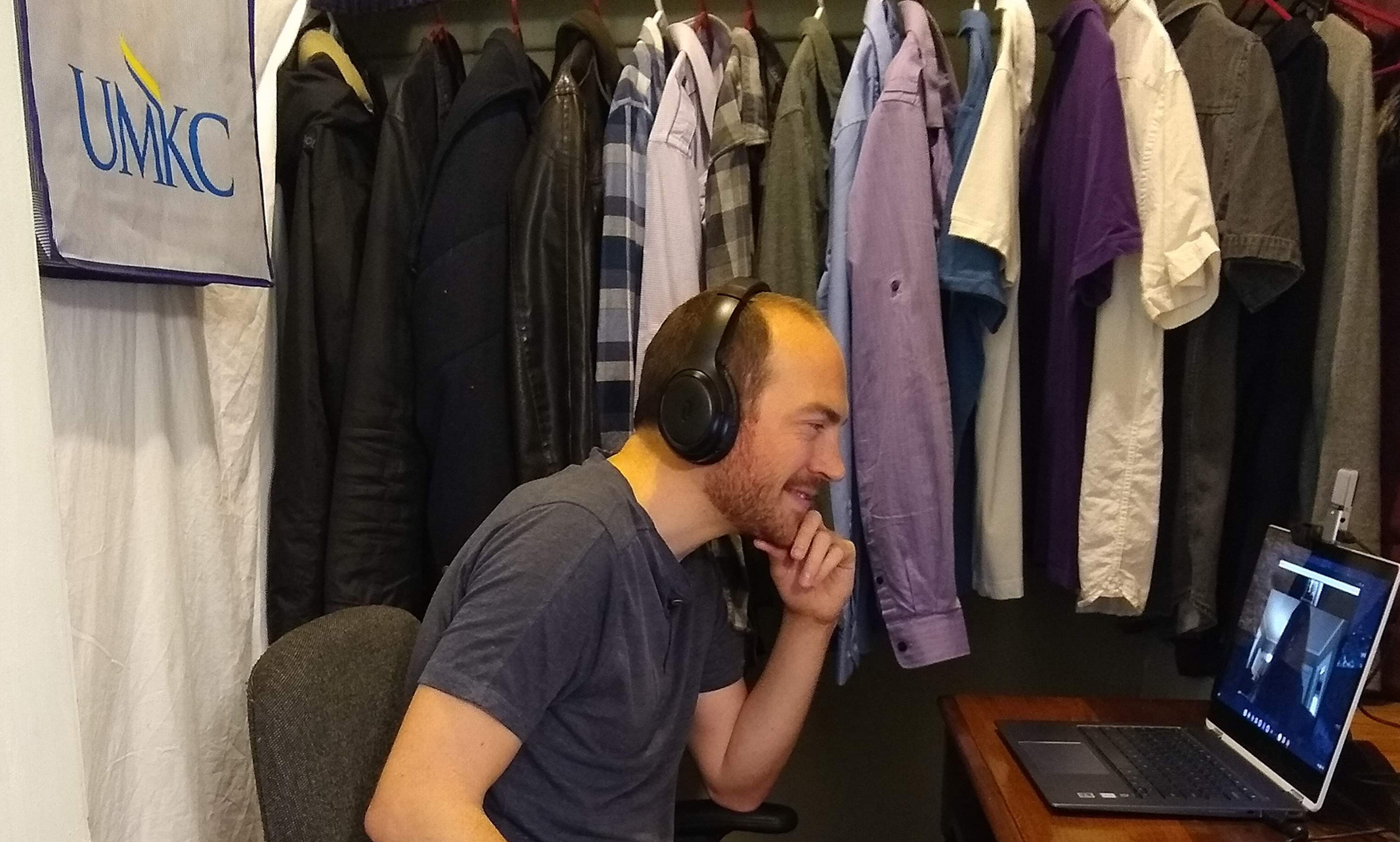
Students gain valuable experience in the world of podcasting
What started as a podcast side project for UMKC faculty member Whitney Terrell, has now evolved into the first podcasting class at UMKC. In turn, the class has so far produced four thought-provoking, student-led podcasts.
Terrell teaches creative writing and in his spare time has a successful podcast called Fiction/Non/Fiction that he co-hosts with V.V. Ganeshananthan of the University of Minnesota. His podcast led Jennifer Phegley, the chair of the English Department, to approach him to gauge his interest in putting together a practicum on podcasting
“The department has always been interested in the digital humanities,” said Terrell. “With me already podcasting, it made perfect sense. And it has been super fun.”
UMKC students have interned for Terrell to help with his podcast, and the success of the internship was another contributing factor to starting the class. Still, Terrell said he and his students were in uncharted territory for the university.
“I’d never asked students to create a podcast from scratch in three months, so I really didn’t know whether we’d end up with something we’d want public,” said Terrell. “And when we got the final product I realized they were this good — we’ve got to get these out there.”
What they got were four unique podcasts. “Everything Genre” — produced by Harmony Lassen, Hunter Moseley and Abbey Outain — teases out the way TV shows use genre tropes. “Lit Adaptations” — produced by Jasmine Rollins, Sophie Straight and Kara Walters — analyzes the ways books are adapted into films. “MFA Insider” — produced by Jared McCormack, Giana Miniace and Montana Patrick — talks to MFA students across the country about their programs and work.
I started listening to their podcasts while I was jogging. I would get to the end of my run, finding myself just enjoying them and forgetting I need to be grading them as well. - Whitney Terrell
All three podcasts can be heard on this website. There was a fourth podcast produced, by Eva June Narber, Summer Collins, and Beth Graham, that did investigative stories on human trafficking, but out of caution for the interview subjects the hosts decided not to make it public.
Terrell was blown away by the finished products. “I started listening to their podcasts while I was jogging,” he said. “I would get to the end of my run finding myself just enjoying them and forgetting I need to be grading them as well.”
McCormack plans to continue the MFA podcast, with a slightly different format rebranded as “MFA Writers” where he will be the sole host but continue to interview fellow MFA students from across the country. He sees it as a useful tool for potential MFA students and filling an untapped niche in the literary podcast space.
“There are a number of podcasts out there that I love that interview established writers about their process,” said McCormack. “I think it would be really interesting to do something similar but with emerging authors on the cusp of making it.”
One thing that hit home for Terrell was the advanced cultural commentary represented in “Everything Genre” and “Literary Adaptations.” “They were putting into practice the techniques that students learn in our creative writing and English programs,” said Terrell. “They were using the skills they’re picking up in the program, and I just love that.”
For the class, the students were divided into four groups, with each group coming up with their own podcast idea. The students were grouped by similar interests. In addition to their own podcast, the students were assigned duties on the Fiction/Non/Fiction podcast so they could practice sound editing and script writing ahead of tackling their own podcasts.
Jasmine Rollins, who worked on “Lit Adaptations,” thought the work on Terrell’s podcast was particularly eye-opening. “I was surprised at how quickly the turnover was from week to week,” she said. “Before the new episode is even up they’re already working on planning for the next episode.”
When it came to finishing production for the students’ podcasts, the class had to get creative because of the shutdown of the campus. They had planned to record and edit everything on campus with the help of a Communications professor, Angela Elam, and using audio software available in one of the computer labs.
Those best-laid plans were turned upside down. The students instead used Zoom to record their podcasts and managed to edit their audio with an any-means-necessary array of free (or free-trial) audio editing software. Terrell said he was amazed by the students’ determination to experiment and improvise to get to their finished products.
The plan is for Terrell’s spring semester Podcasting Practicum class (ENG 449C) to continue. Another podcasting course will be added in the fall in the Communications Studies Department (class #46784), taught by Elam, who is host of the “New Letters on the Air” podcast.
For McCormack, the experience was incredibly rewarding. ““I didn’t know anything about making a podcast before taking this class. This was a great way to get my feet wet learning from someone who is actually doing it,” he said. “You really see what all goes into making a podcast before you jump straight into it.”
Jun 04, 2020
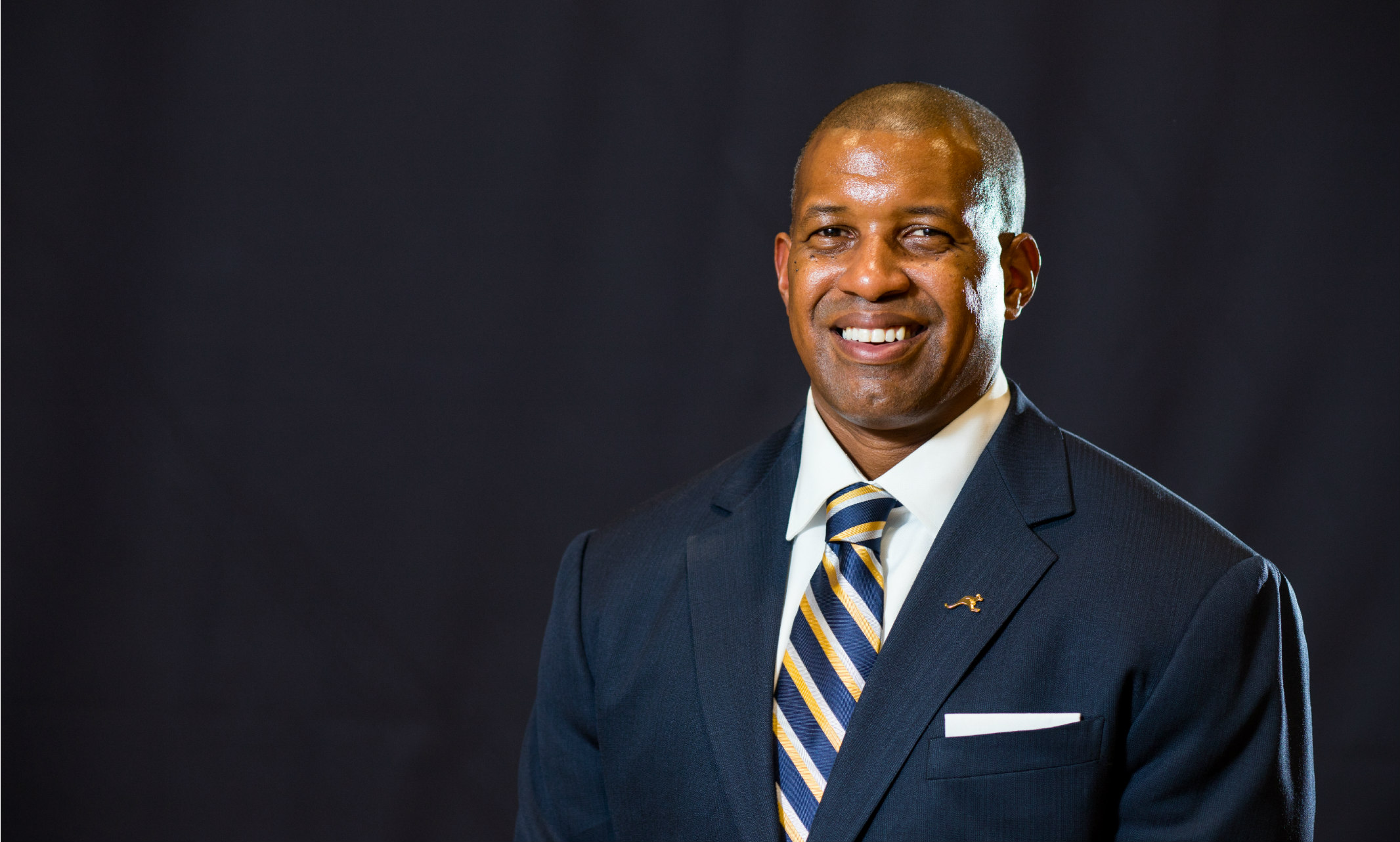
Checking in to see how our UMKC community is managing the highs and lows of sheltering in place
UMKC Athletic Director Brandon Martin is off the court, off the field and home with his wife, two daughters and son. He’s been home with his family more than ever before — and finding that he loves it.
“It’s really going great,” Martin says. “We are having a ton of family time and I’m just so grateful that my family is all here and safe.”
He and his wife, Rosemary, who works in human resources at Metropolitan Community College, are both working at home in their basement and home office. His oldest daughter is home from her first year of college.
“She came home from Arizona State University with straight As,” he said. “We were just thrilled”.
His younger daughter and son were both going to school remotely.
“They were going to school in their bedrooms and basically living on their iPads.”
The Martins are all pitching in and helping each other out, and they are taking a lot of family walks.
“I love it,” he says. “I’ve been home more now than I’ve ever been before. Balance has always been tough for me, but I feel like the ratio is good right now and it makes me feel fulfilled.
We had a great Mother’s Day. I couldn’t stop thinking about what it would be like if my wife weren’t here. It just filled me with so much gratitude.”
Still, Martin is aware of the suddenness of his athletes’ season ending and he understands the loss they are feeling.
“I have a great respect for the resilience of our athletes and coaches. Their seasons ended so abruptly. I really appreciate how willing they were to take the appropriate directions. They were all patient, focused and centered.”
Despite his positive perspective, Martin struggles with the ambiguity of what will come next.
“I am trying to crystallize what the ‘new normal’ is going to be. My life — my job — are never going to be the same. In my life and my career, so much of it is about competing. Now we’re competing against the unknown, but I know we’re going to get through this.”
What are you reading?
“Laws of Human Nature” by Robert Greene
“How Champions Think: In Sports and in Life” by Bob Rotella and Bob Cullen
“Daily Stoic” by Ryan Holiday and Stephen Hanselman
“Managing from the Heart” by Hyler Bracey, Jack Rosenblum, Aubrey Sanford and Roy Trueblood
What are you watching?
“The Last Dance.” It’s epic and it’s great family time for us. I love educating my kids about the greatness of Michael Jordan.
“Billions.”
What are you eating?
I love to cook, and I’ve started posting on Instagram with the hashtag thecookingad. I just made Baja fish tacos.
Jun 04, 2020
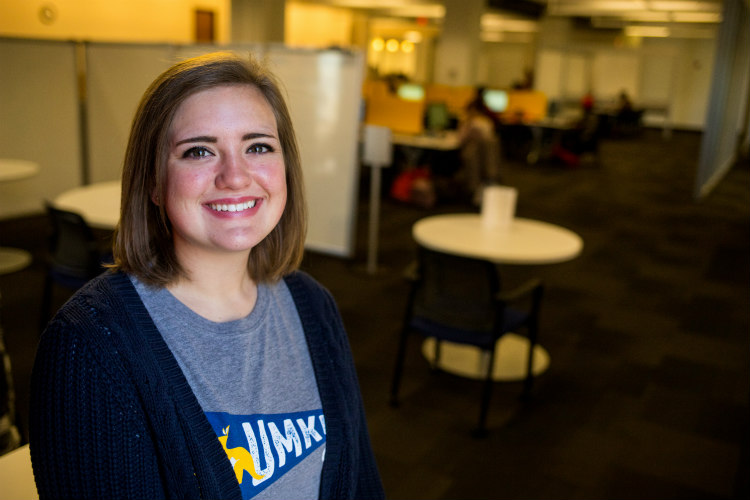
Senior Hayley Benton wants to help people learn
Get to know our people and you'll know what UMKC is all about. Hayley Benton has wanted to be a teacher since she was in first grade, and a degree in education has been a long-time goal.
Hayley Benton ’21Major: Elementary EducationHometown: Omaha, NebraskaHigh School: Millard North High School
A visit to the UMKC website led Benton to visit campus. That visit resulted not only in her enrollment in the School of Education, but her immersion in campus life as a Resident Assistant, a member of the Honors College and a campus ambassador. In addition, Benton was selected as a member of the UMKC Forward committee exploring solutions for university success in the midst of the COVID-19 crisis.
Benton is a helper and her focus during the crisis has largely been on the success of others.
“They say that you’re supposed to put your oxygen mask on first when the plane is crashing, but, that’s not me,” Benton says. “I wouldn’t be able to help people a row or two behind me if I did that. I would be the one running up and down the aisle making sure everyone has their mask on — or had the ability to put their own mask on. If I see someone who needs help, I drop whatever it is that I am doing and I help them no matter what.”
She has stayed on campus and expanded her role with Residential Life to help the students who needed to remain on campus.
“For me, helping students was crucial to my success and really helped me during such a challenging time.” — Hayley Benton
“I am staying on campus throughout the summer as an RA as well,” she says. “For me, helping students was crucial to my success and really helped me during such a challenging time.”
Despite her commitment to students at UMKC, Benton is missing the children in her elementary-school classroom.
“The biggest challenge was that we were no longer able to go to our practicum placements, so my student teaching experience got cut very short,” she said. “I wasn't able to say goodbye to the class. I went from seeing them almost every day to absolutely nothing. I miss their smiling faces, jokes, personalities and out-loud thoughts. It's definitely pulled on my heartstrings.”
She has been able to stay close to her cohort in the School of Education. Beyond online classes, the GroupMe Benton started became an essential way to connect.
“We used it a lot prior to COVID-19, but once classes went online we used it a ton! While we couldn't see each other in person it still felt like we were connected and interacting with one another and building our relationships,” Benton said. “A lot of us faced very difficult things during this time as well and it was amazing to have such a strong support system of empowering women.”
“I’ve learned that I am a strong leader and that I am able to do anything I set my mind to.”
While she is not the first person in her family to attend college, Benton is the first person in a long time.
“I take a lot of pride in my academic drive, my passion for getting a degree in education and for pursuing my dreams this way because it’s not the conventional thing for the rest of my family.”
She has learned a lot about herself since coming to UMKC.
“I’ve learned that I am a strong leader and that I am able to do anything I set my mind to. In high school, I was only involved a little bit. In college, I have thrown myself into a ton of new things in order to be as involved as I can be. I have grown so much as a person.”
Her student teaching and the current crisis have opened Benton’s eyes to the challenges students face and has deepened her commitment.
“It has inspired me to work as hard as I can to better an education system that is failing for a lot of people. I want to pour my heart and soul into my students.”
Hayley’s Highlights
Who do you admire most at UMKC?
Elora Thomas, associate director of admissions, is the person I admire most at UMKC. I am a campus ambassador and Elora is my boss. She is so strong and powerful, and inspires me to be the very best I can possibly be. Sometimes I can get very discouraged because my family members and friends back home don’t understand the value of my work on campus, but Elora has always been so supportive. She has so much passion for this university. I just hope that one day I can be someone’s Elora Thomas, because she is the best person I have ever met.
What’s your favorite social media channel?
RawBeautyKristi on YouTube is so amazing. She’s a very realistic, down-to-earth person who gives her actual opinion on things. It’s so refreshing to hear someone talk about real life on their social media platform rather than the fake stories people make up for entertainment.
What’s something that you’re missing?
I miss aimlessly wandering around Target for over an hour looking at things I never end up buying. Of course, it's a small thing, but it's all about routine.
Where are you finding joy?
I have gone on a ton of walks and I've gone hiking a couple of times. I spent a lot of time—maybe too much time—playing Animal Crossing.
Jun 04, 2020
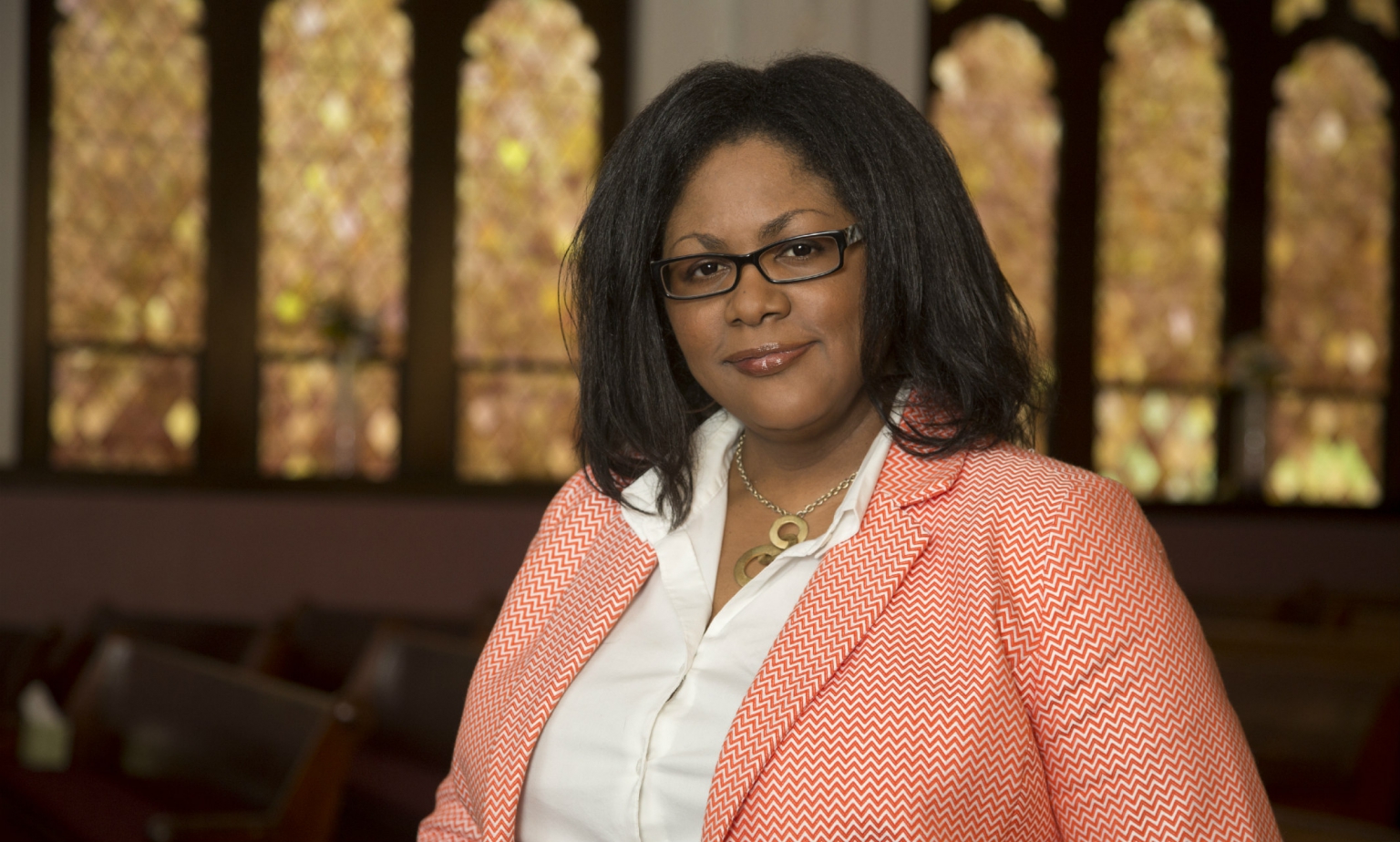
The UMKC Health Equity Institute brings together university researchers, government and community efforts to improve the lives of the underserved
When Chancellor C. Mauli Agrawal needed someone to head the new UMKC Health Equity Institute, he didn't have to look far. The School of Medicine’s Jannette Berkley-Patton is a leader in community health research — just the right person to direct the institute, which is charged with combining the university’s research strengths with community groups’ grass-roots involvement to identify, quantify and reduce health care gaps.
Berkley-Patton, Ph.D., a professor in the school’s Department of Biomedical and Health Informatics, might be best known for her Taking It to the Pews project, an outreach effort through local churches that gets people tested for HIV. She also is director of the UMKC Community Health Research Group, putting her in an ideal position to bring together the university’s research programs and Kansas City social services groups and agencies.
In the year since Agrawal announced the institute, Berkley-Patton has made sure it got off to a running start. The institute has helped new projects large and small, with the goal of lasting improvements in health across social and economic classes. Anything that might improve health — from providing better transportation and more-affordable care to encouraging better eating and exercise — could be involved.
“We spend billions on health care but are still one of the unhealthiest countries in the world,” said Berkley-Patton, who has degrees in engineering, human development and family life, and child and developmental psychology. “Large federal grants can help create effective programs, but we need sustainable improvements that continue when the grants end.”
Berkley-Patton also is determined to keep the institute’s momentum moving forward, despite the COVID19 disruptions to health care and the wider economy.
“In fact,” she said, “the Health Equity Institute is even more important than ever given that these underserved folks who historically have had more challenges in accessing health care services are likely to be hurt the most by the disruptions.
Get on the bus
One big project for the institute will be tracking how free bus service affects people’s health. This year, Kansas City, Missouri, plans to become the first large city with free public transit — dropping bus fares to zero to match the city’s streetcars, which already are fare-free.
The institute, recognizing a golden opportunity to measure the benefits of free public transit, has drawn up a multi-step research plan and submitted ambitious applications for grants from the National Institutes of Health and the Centers for Disease Control.
The CDC grant calls for research into “a natural experiment,” Berkley-Patton said, “and if ever there was a natural experiment, offering free transit is it.”
She continued, “We know from other research that people who use public transit tend to get 5 to 15 minutes more physical activity than non-riders, just getting to and from public transit. So if free bus service increases ridership, we hope to also see improvements in the health of people in low-income areas.”
The institute will start by gathering baseline data, both from comparable cities’ transit systems and from 500 current riders. The plan for identifying those people and getting data from them has been approved by UMKC’s Institutional Review Board, which ensures that research subjects are treated ethically. That data gathering is on hold over COVID-19 concerns, but the institute is ready to go when the situation improves.
The CDC grant the institute seeks calls for data on 10,000 people, which defies individual recruitment. “So, we’re proposing to collaborate with the Truman Medical Centers,” Berkley-Patton said. “We have identified 11 low-income ZIP codes, and TMC has data on thousands of people that can serve as a measure of the health of those areas.”
Of those patients, the institute hopes to have 4,000 take a brief survey, to gauge some basics about them such as income and incidence of health problems including diabetes and obesity.
The institute also plans to recruit 200 occasional bus riders to track, to see whether free service turns them into regular riders, and whether that improves their health.
Berkley-Patton says the elimination of fares should be a good incentive, saving a regular rider an estimated $1,500 in transit costs. And the research should identify other possible benefits, such as having access to more and better jobs.
“We’ve had lots of collaboration on this already to design research and make our grant proposals,” Berkley-Patton said, ticking off allies from Children’s Mercy, the Kansas City Area Transportation Authority and Public Works Department, UMKC Departments of Economics and Psychology, and the Schools of Dentistry, Medicine, and Nursing and Health Studies.
Now the institute must wait — on whether it gets CDC and NIH money to go full bore on its plans, and on when people can resume more normal living and head to jobs, doctor’s appointments and other activities.
‘They miss recess’
Another project is Youth Engagement in Sports, or YES, led by Joey Lightner and Amanda Grimes, UMKC assistant professors in the School of Nursing and Health Studies. When their proposal received an $800,000 grant from the U.S. Department of Health and Human Services, Grimes described the need to increase activity in middle school students.
“The evidence is very clear that American youth suffer from high rates of obesity, inactivity and poor nutrition,” said Grimes, who has a master’s degree in health science and a doctorate in community health.
Joseph Lightner and Amanda Grimes of the School of Nursing and Health Sciences involve students in their community health research.
“Adolescence seems to be a critical time in a child’s life where behaviors are learned or reinforced. Girls are particularly prone to low rates of physical activity during adolescence.”
The YES program will help students at two Kansas City middle schools, Central and Northeast, said Lightner, who has a master’s in public health with an emphasis in physical activity, and a Ph.D. in kinesiology.
According to Lightner, sixth- through eighth-graders are in a tough place between elementary and high school. “In talking with them, we found out they miss recess. They don’t get to play anymore. And they’re suddenly supposed to be adults, often without all the information they need on health and nutrition.”
One goal of the institute is to come up with innovative programs, and YES is certainly that.
“So after school, we’re going to give them a big, healthy snack and then there’s a physical activity intervention — they get to play,” Lightner said. “We’re going to offer competitive and non-competitive games, because we’ve found that some students gravitate to one kind of sport or another.”
By reaching out to the students and their schools, the program also embodies the institute’s emphasis on community engagement. And it draws heavily on another institute strength — collaboration.
TMC’s Mobile Market, which brings healthy foods to underserved areas, will give students a weekly bag of produce along with recipes. Children’s Mercy consulted on the program, providing its expertise with young people’s health. The Kansas City Department of Parks and Recreation will help with the sports activities.
And Lightner, as director of the UMKC Public Health Program and a new bachelor’s degree under it, has recruited undergraduate students to help gather data — and get first-hand experience in devising and tracking the sorts of programs that could become integral in their careers.
The program’s aim is to help at least 300 students at the schools in summer sessions, and then again in the fall. Of course, the level of disruption and other unknowns caused by COVID-19 make it hard to plan. But when school is back in full swing, Lightner wants YES to be making a difference.
“We know this is a pivotal time for students, especially girls,” Lightner said. “Peer groups are really important; there’s a mentality of, ‘If my friends are doing it, I’ll do it.’ So if we get them engaged in physical activity with their friends at this age, they’re likely to continue. And so many benefits, from physical and mental health to staying in school and achieving academically, have been demonstrated.”
Seeding other efforts
Another goal of the institute is to communicate across the university and among hospitals, government health agencies and community groups. A database is being compiled for training and other resources, along with opportunities to collaborate.
The institute's new website will be a clearinghouse for everything from health indicators to grant opportunities and processes. That could help community groups connect, for example, with the Health Forward Foundation, a Kansas City fund that promotes healthy communities.
The institute also will be awarding mini-grants, with the aim of giving several community groups a few hundred dollars each for health-related training, software, added staff help and other basics.
Overcoming health disparities is a huge task, made more daunting by the COVID-19 disruptions. But BerkleyPatton and other Health Equity Institute partners have had success in the past and will keep looking for new ways to reshape access to health care.
“It will be a while before we know how much damage the pandemic has done,” she said. “But we do know that research programs that involve people in improving their own health can make a real difference, and it’s going to take all the innovative, collaborative efforts we can build to help those most affected.
Jun 03, 2020
As protesters and police clash in cities from coast to coast, Kansas City discusses a way forward
Ken Novak, professor of criminal justice and criminology at the University of Missouri-Kansas City, was a guest on KCUR's Up to Date.
Jun 03, 2020
Ken Novak, UMKC professor of criminal justice and criminology, was a guest on KCUR's Up to Date.
The June 2 show was devoted to hearing what listeners have to say about the situation, which included a journalist, faith leader and criminal justice expert. Listen to the segment online.
Jun 02, 2020
Police report 68 homicides so far this year, compared to 56 in the same period a year ago
Ken Novak, a criminologist at the University of Missouri-Kansas City, offered this perspective: Kansas City’s per capita homicide rate last year was about 30 deaths per 100,000 residents. Read the full article from the Associated Press.
Jun 01, 2020
Max Skidmore has been providing local and national media interviews
Max Skidmore, author of a book on presidential leadership during health crises, was quoted in an article by the Washington Post e-Replica Newspapers in Education.
Jun 01, 2020
